#canon. | the otherworld *
Text

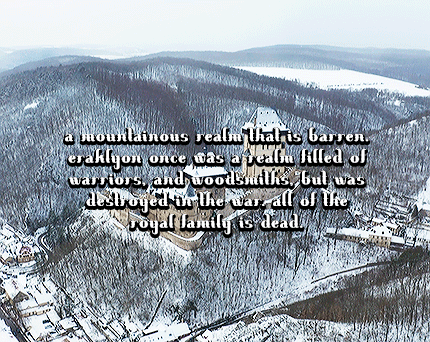
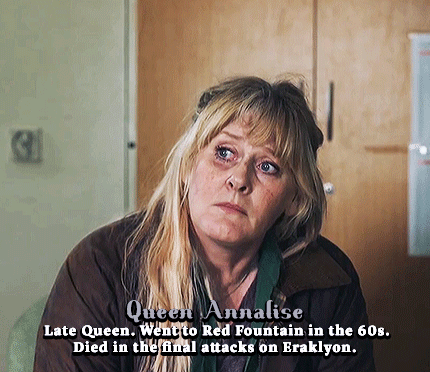


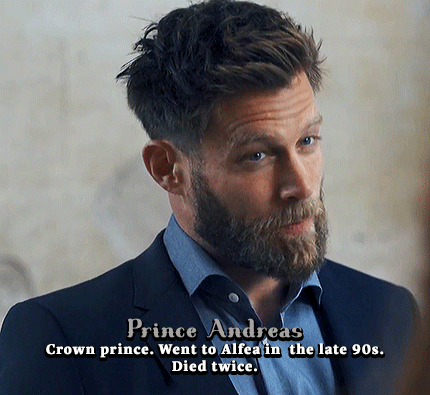


A LOOK INTO THE OTHERWORLD'S REALMS:
E for Eraklyon
a mountainous realm that is barren. eraklyon once was a realm filled of warriors, and woodsmiths, but was destroyed in the war. all of the direct royal family is dead.
Royal Family
Queen Annalise - the late Queen. Went to Red Fountain in the 60s. Died in the final attacks on Eraklyon.
King Reinhard- the late King Consort. Went to Red Fountain in the 60s. Died in the final attacks on Eraklyon.
Prince Elias- the late prince. Went to Red Fountain in the 80s. Died in the final attacks on Eraklyon.
Prince Andreas - the Crown prince. Went to Alfea in the late 90s. Died twice.
Prince Sky - Heir to the nonexistant throne. Goes to Alfea. So many daddy issues.
@winxsource
#eraklyon#fate the winx saga#ftws#fatethewinxsagaedit#ftwsedit#gifs#gif#*mine#otherworld realms tag#ish tag#userzackmartin#just putting a disclaimer that is all hc#pls no comments abt how its not canon or canon has been changed#you will be ignored lol
60 notes
·
View notes
Text
anyway uh green grass definitely does not show up in the underground huh
#im gonna keep not tagging these its brainrot time fuck you#that being said if the otherworld theory is confirmed canon im gonna lose it thats my LEAST FAVORITE ONE
47 notes
·
View notes
Text
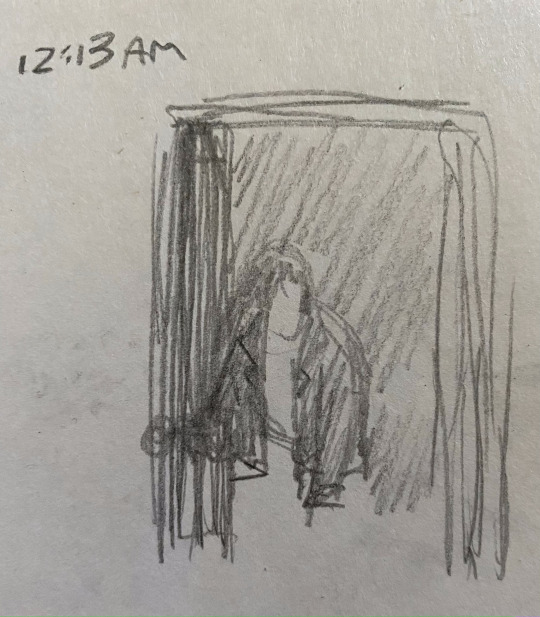
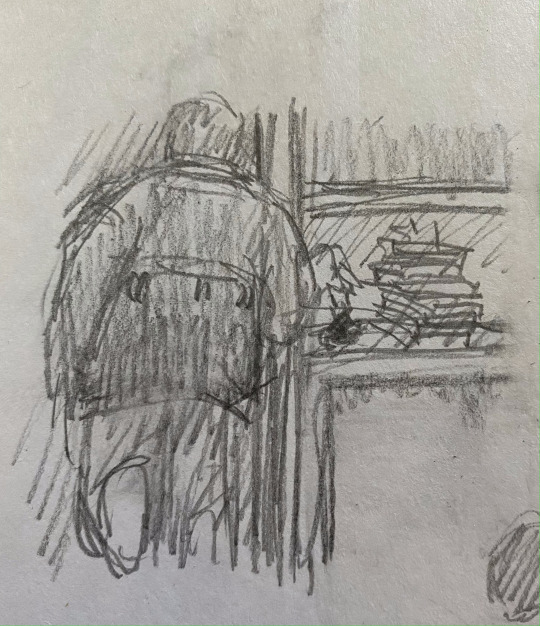
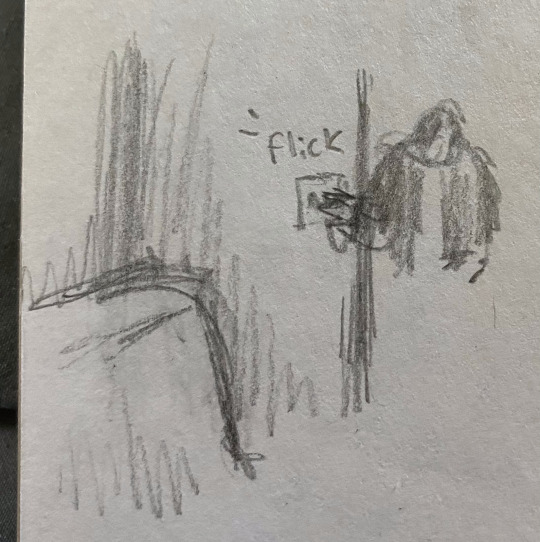
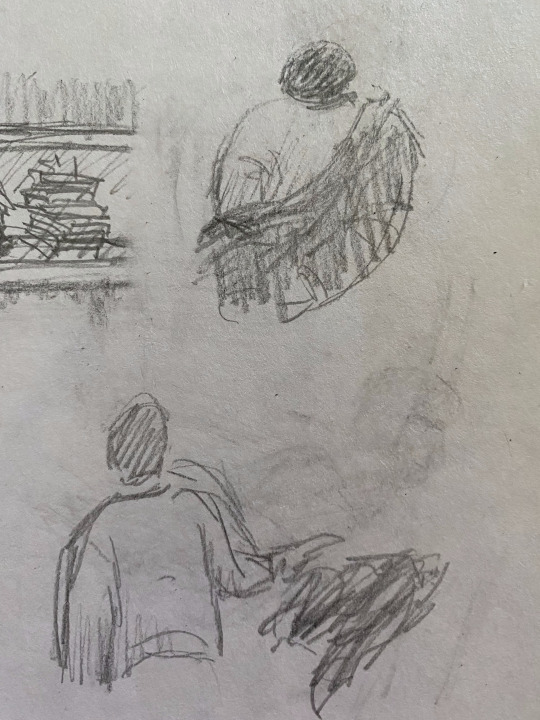
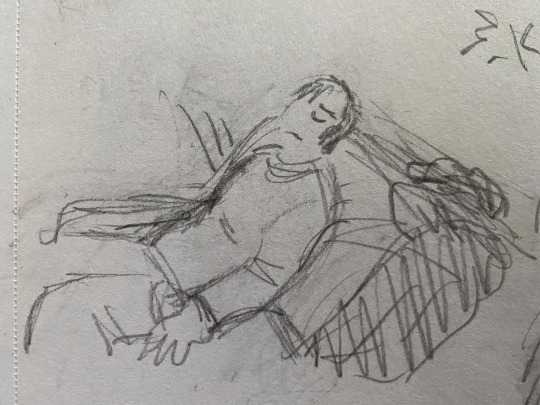
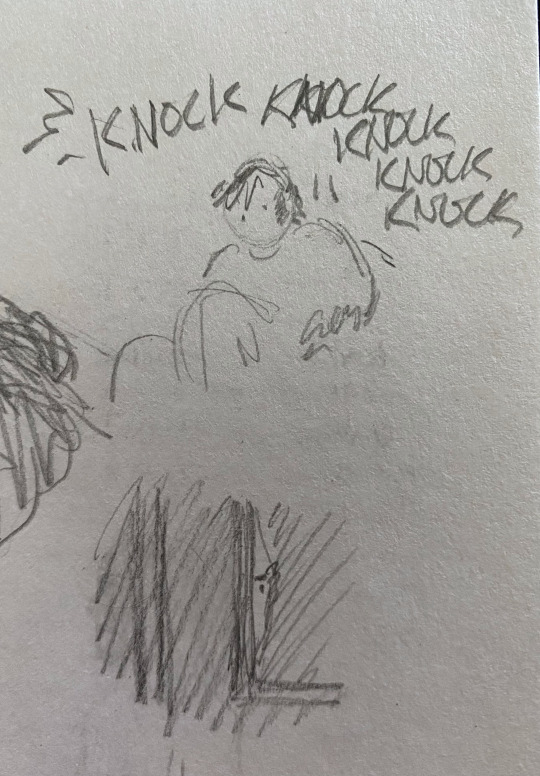
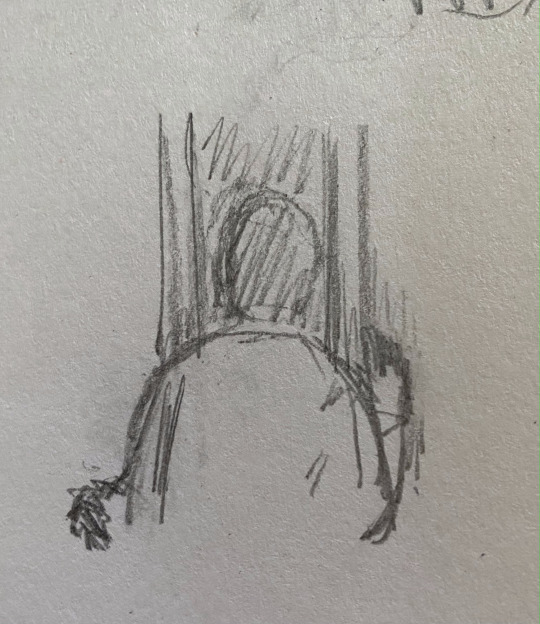

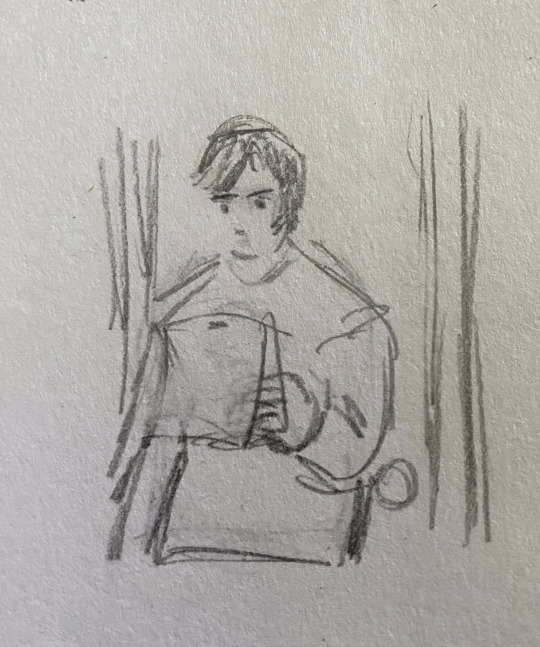
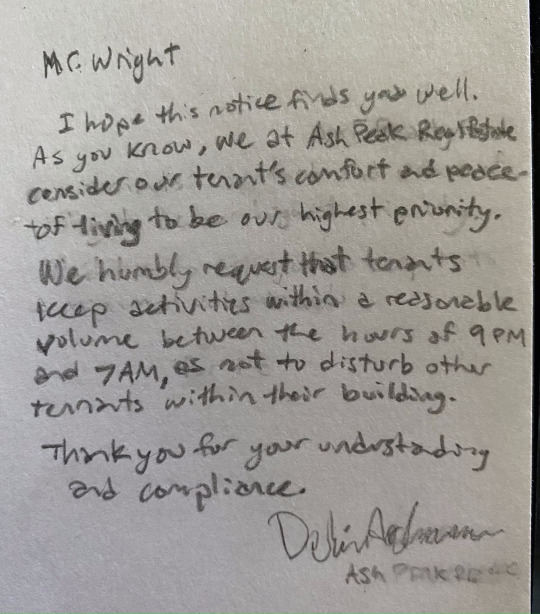
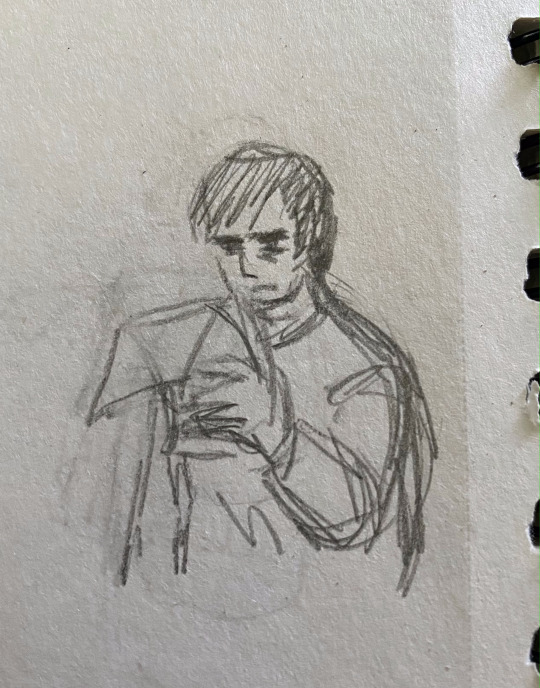
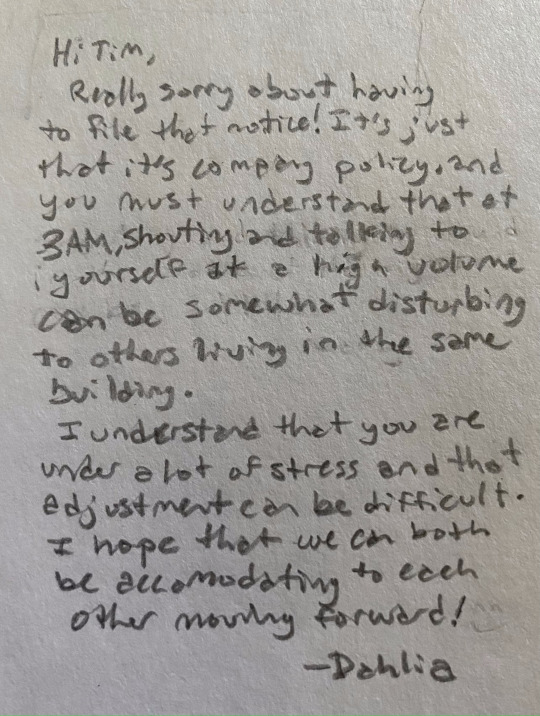
20 8 5 25 23 9 12 12 14 5 22 5 18 1 3 3 5 16 20 25 15 21
[<<] [<] [>]
#whysopasta otherworld au#whysopasta art#marble hornets#tim wright#mh#comic#long post#sketch#sketchbook#i am so relieved i got another one of these done even if its short and messy and not very eventful. i was in such a hole#please ignore the smiley the smiley is not canon#fan art
42 notes
·
View notes
Text
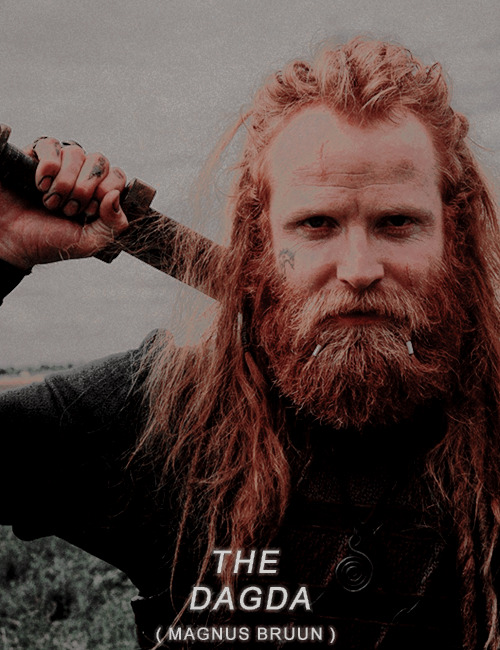
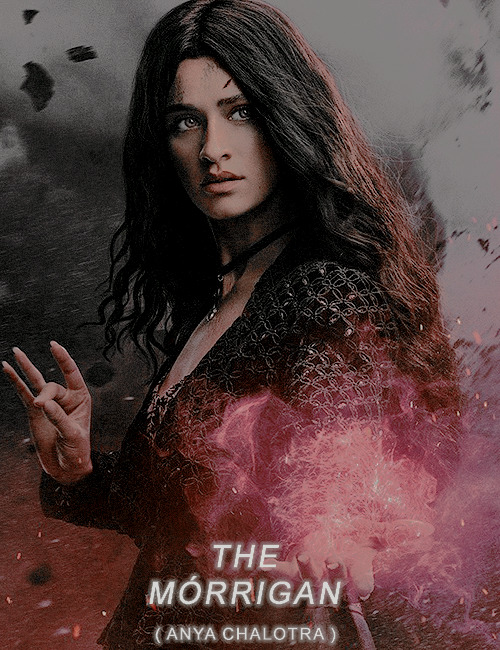
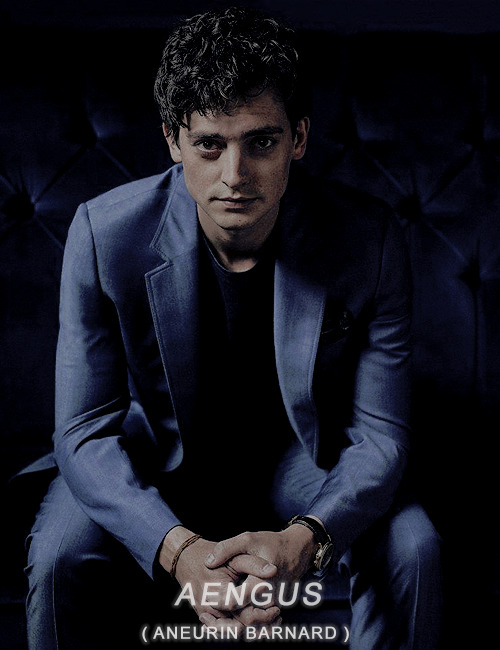
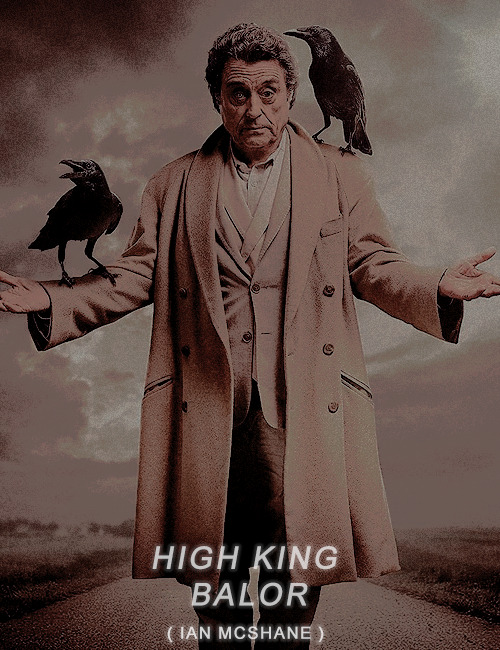
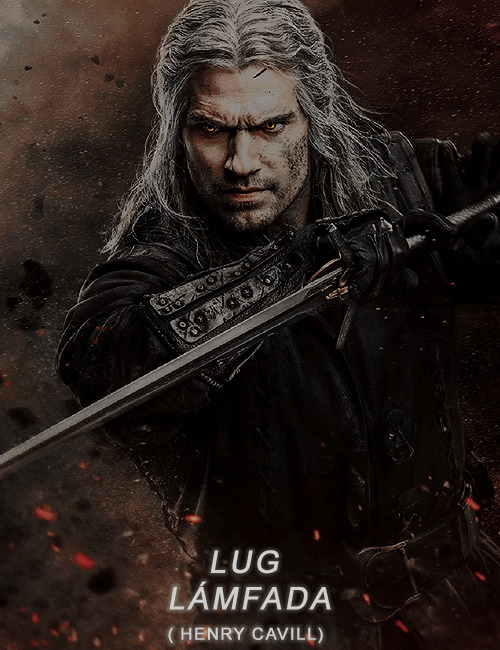
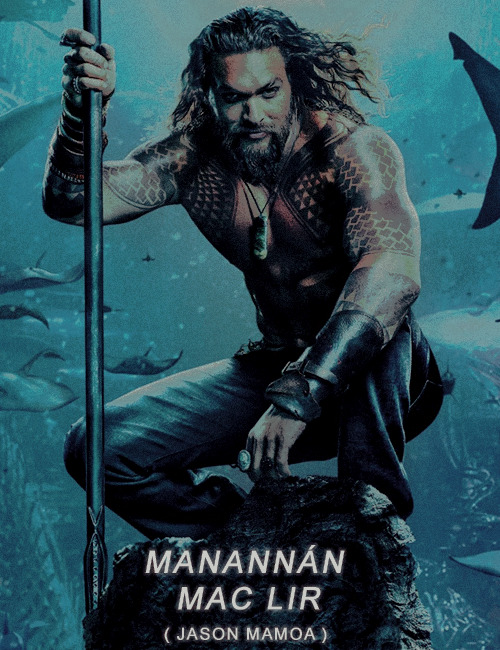
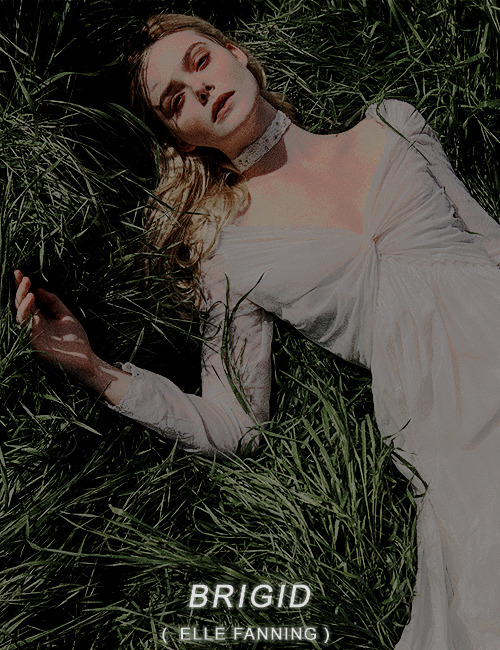
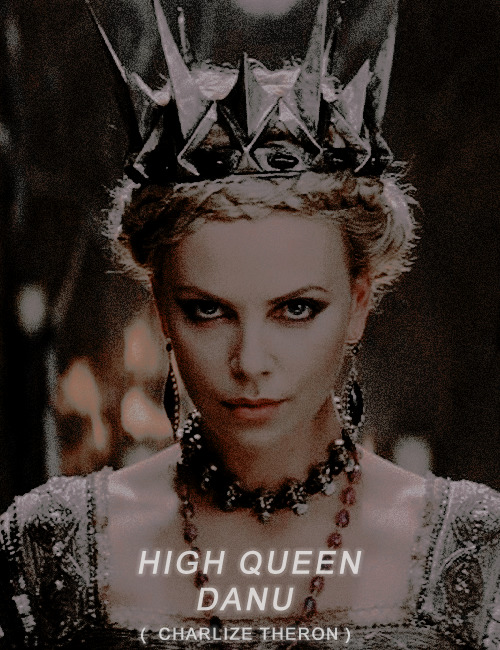
THE GODS OF THE SEELIE COURT & THEIR FCs // pt. 1
Balor - High King / Leader of the Fomorians/enemies of the Tuatha dé Danann
FC: Ian McShane from American Gods
Territory: all of Dubnos - AKA “the Hells”
Manannán mac Lir - Warrior King / God of the sea
FC: Jason Mamoa
Territory: Mag Mell & Emain Ablach ( island paradise of the Otherworld )
Aengus - God of youth, summer, love, and poetry
FC: Aneurin Barnard
Territory: Tír na nÓg
The Dagda - Chief/General of the gods
FC: Magnus Bruun Nielsen from The Last Kingdom
Territory: Mag Mell - land of greatness achieved through honorable death in battle
The Morrígan - Goddess Queen of war, magic, & death
FC: Anya Chalotra from The Witcher (main) Linda Cardellini (alt)
Territory: Mag Mell - land of greatness achieved through honorable death in battle
Lugh - Warrior King & God of the sun & arts
FC: Henry Cavill from The Witcher
Territory: Mag Mell - land of greatness achieved through honorable death in battle
Danu - High Queen of the faeries / head of the Tuatha dé Danann ( the people/children of the goddess Danu)
FC: Charlize Theron from Snow White and The Huntsman
Territory: all of Albios - AKA “the Heavens”
Brigid - Goddess of Healing, Fertility & Protection
FC: Elle Fanning from Sleeping Beauty
Terriroty: Tír na nÓg - paradise / “the land of youth, health, and beauty”
#the mórrigan. | fae queen of war & magic *#the dagda. | the druid king of war *#lugh tag tbh#canon & lore. | the fae *#canon. | world lore *#canon. | the seelie court *#canon. | the aos sí *#canon. | the otherworld *#i should make tags for all of them but nah#too much work atm lol#ooc. | * edits and art !#canon. | gods & goddesses *
15 notes
·
View notes
Note
I was a Stark fan earlier but reading your fics made me change sides very much. Starks now seem so very boring compared to Targaryens even the more interesting ones like Robb or Arya pale in comparison to say Daeron I or Visenya the conqueror. Now it seems to me that Starks aren't even that good for sidekicks, Velaryons are better maybe even Tyrells.
A wolf is a majestic creature a direwolf even more so but what could ever compare to a dragon.
Happy to spread the Targaryen supremacy and make everyone aware ✊🏻 We STAN the hot dragon people with silver hair and purple eyes 🐉
Not only was Dany already the best character but her family only makes her even more epic!
All of us to House Targaryen:

Haters cry. Cry harder!
Also yey on you joining us Anon:

Come to the Targaryen side! We have the coolest characters and the cleanest skin 🙆🏽♀️
PS: This is only true of the canon asoiaf Targaryens. Because books >>>>>>>>>>>>>>>>>>>>>>>>>>>>>>>>>>>>>>>>>>>>>>>>>>>>>>>>>>>>>>>>>>>>>> trash >>>>>>>>>>>>>>>>>>>>>>>>>>>>>>>>>>>>>>>>>>>>>>>>>>>>>>>>>>>>>>>>>>> redacted
#targaryen supremacy#House Targaryen#y'all want this milkshake for your faves but they can't handle the heat#fire and blood#canon asoiaf Targaryens#silver hair purple eyes and otherworld beauty#because the antis can't keep the Targs from their mouths#they even make sh:tty shows about them#but we know who the book is about 🔥#House Targaryen >>>>>>> Everyone else#popcorn promotes Targaryen supremacy#and answers
7 notes
·
View notes
Text
Maple’s Melfel Megapost: Lovesick Obsession and Conspiracy-Style Origins
I mean the title says it all. I’m here to scream about Melfel. Main points are his relation with Elhaza and my thoughts regarding backstory. Very long post ahead, feel free to read but uhh TL;DR I love melfel a very normal amount. BF2 spoilers ahead, questionable accuracy at some parts bc I’m not a lore expert, but I put a lot of time into this so hopefully it's mostly accurate, coherent, or entertaining to read if nothing else.
First off, shoutout to @/symonynii for sharing the bf2 translation w me, all the script quotes are from their work, thank you for fueling my brainrot and permanently altering my brain structure. Quotes from that translation will be this fun purple >:) Translations from Rexona will be this cool green :p Also melfel is referred to with he/she/they in this doc just fyi
Melfel is a massive simp for Elhaza
When investigating this relationship, it’s very obvious Melfel has this obsessive near-worship level of respect for Elhaza. If you took a shot every time Melfel reiterated that everything they do is for Elhaza (or “that man”... haha edgeworth vibes just call that mf your husband) you would die from alcohol poisoning, he constantly talks about it. But they also trust Elhaza with their life, or at least enough for some soul-related experimentation to take place:
"Melfel: Yes~ Oh, but don’t worry. I’m only a clone that contains part of my spirit. I was made by Elhaza"
"My existence is only for Elhaza, please do not misunderstand that..." (Resonance line from BFR). This level of devotion is just ffsdfdfsldfldfsdfldf. My brain melts. He gets irked if you assume he's working for Nogreth due to loyalty for Nogreth's cause, he wants to reiterate that he is loyal to Elhaza above all else. Man. Same sentiment is shown here too:
"Tiny Melfel: ...Of course. Everything is for Neo Orcus. Of course~
Tiny Melfel, to himself: Well, for me, it’s more like “everything is for Mr. Elhaza”. I only exist for that person..."
I have already gushed about this development multiple times but it drives me crazy. Melfel starts the game being completely unable to comprehend how someone can sacrifice themselves for the sake of others
"Melfel: Oops... hey, I wonder what I should do now... To give yourself up to protect others... how does one act on such a feeling?"
And then at the end of the game he sacrifices his life to protect Elhaza and his work from the protags it drives me feral. Their bond with Elhaza, their love for him pushed them to make the ultimate sacrifice all for him. It makes me crazy, how much love and devotion one has to learn and accept how much they would give up.
Adding on, Melfel’s last words?????
“Elhaza......I... always….”
I always WHAT?? I always loved you???? It’s very specific structure, it can’t be spun in some way like “I was honored to serve you” it sounds like a full-on love confession. Having a man’s name be your last words as you try to address them one last time,,, idk seems pretty gay gay homosexual to me.
Also, this bit kind of dives into headcanon territory, but I view the tiny melfels as fragments of Melfel’s soul, so it’s crazy and emotionally gutting how even after death a part of Melfel’s soul cares about Elhaza, it makes me feral this clown is so in love. Her love extends past life and death and every part of her soul screams about her love for Elhaza, it's just aaahdjshjkssdskadsdk peak romance.
“(we see tiny melfel carrying elhaza’s mask across a black screen, and he grins at us)”
And this Rexona voice line drives me crazy like OH MY GOD???? This is so much. mf wants him so bad.
"Elhaza is everything to me. What he wants is what I want. His enemies are my enemies."
Elhaza’s feelings (or lack thereof)
Now it’s a lot more difficult to find examples of Elhaza’s thoughts about Melfel bc we just. Don’t see much of him and he rarely talks about them which is :/ And it also can just read as Elhaza doing the bare minimum to keep Melfel in line with him instead of genuine sentiments. But there are some instances.
Most notably when Melfel leaves for their final encounter with the protags, they mentions how they had to ask Elhaza to face you, Elhaza didn’t originally want/order Melfel to be out there and likely took some persuasion to agree to let them go. So maybe he does care? He seems to have held some concern for her safety, because as this point Nogreth’s demon lords have kind of been falling apart both internally and with the protags taking them down
“Melfel: ...You can say whatever you want, but we have something to do. It’s for that reason that I asked Mr. Elhaza to send me back here. It’s ridiculous to think that you’re the protagonists of this world~”
Additionally there’s this whole dynamic they have before encountering the protags and og gang together ft. Melfel being so so excited and hyped about working with Elhaza while he’s just like “cool :/ ”.
"Melfel: Mr. Elhaza himself will go? This is unusual. I thought the interception would be left to me.
Elhaza: ...It’s not a bad idea to get a look at their faces.
Melfel: Oh, I’ll come and help you! It’ll be an honor~
Elhaza: ...Hmph."
Just gonna drop this here too because it’s a fun moment, Elhaza really just said “lmao go crazy”. I think he has some sentiments towards Melfel, but it’s not nearly as much as Melfel holds for him.
“Melfel: Of course~ I’ll get support for Hilda and Lune... And above all, the killing of weak summoners~
Elhaza: Hm... enjoy yourself. You might be able to use support from Shaia in some cases.
Melfel: I understand~ And now, I’ll…”
They both really have a thing for encouraging each other to kill and complimenting murder. Typical evil lovers behavior.
"Melfel: As expected, Mr. Elhaza! An instant kill as always, it’s wonderful~
Elhaza: ......
Melfel: Ah.... but it looks like you’re not pleased.
Elhaza: ....... It seems like the damage was much lower than normal. I’ll entrust you to the rest. Do whatever you want.
Melfel: Is it alright to kill that Weisser as well?
Elhaza: I don’t care.
Melfel: Wonderful. Then I’ll have a great time~"
Of course Shida's whole character plays a role in how he expresses himself. Due to how long he's lived and extended his life, he's become very disconnected from human emotions and bonds, viewing them as something interesting to study rather than an actual experience.
"Human beings are truly interesting.
Life and death, bonds, negative emotions…no matter how much we study them, there is no end to them.
They are silly, beautiful, and irrepressible."
So it makes sense how neutral and even dismissive he is towards Melfel and his clear expressions of devotion. Additionally, Shida seems to be focused solely on his research, he sees everything as a way to advance his work.
Their relationship is inherently tragic because of how little Elhaza cares when compared to Melfel’s obsession. But because of Melfel’s nature they just don’t seem to care. Even the smallest recognition is enough for him. They feel fulfilled with what they get, even overjoyed. It makes you wonder… what did Elhaza do to cause such a strong infatuation? Well, I have a buckwild frankensteined mess of canon, headcanon, and stretches of connections to potentially explain it.
Smashing together a backstory for Melfel
Brave Frontier Rexona actually flat out states Melfel's backstory, which genuinely surprised me ngl. I just tossed this from the brave frontier library site into DeepL so hopefully it's somewhat accurate:
-Blind faith in Elhaza-
He joined Nogreth when they invaded his home world of the Otherworld.
As a man of very low status, Melfel saw Nogreth who had destroyed his world as a god of salvation.
His cunning mind and talent for magic were bought by Elhaza, and his absolute loyalty to him led him to become the head of the legion in the blink of an eye.
In addition, he seems to have led many insane subordinates.
So, Melfel is from the Otherworld, which made me cry because I had to watch all the cutscenes from the Otherworld section of the game to piece together the lore since I never reached there lmao. But more notably, Nogreth invaded Melfel's home and he viewed them as his savior. He hated his life and saw the destruction of it as a saving grace, a moment for him to achieve the greatness and power he likely desired. This low-status background ties in really hard to what Roy brought up to Melfel in their trauma mirror confrontation.
“Melfel: Every human has a wound in their heart. This mirror picks it out and shows them it~ It’s prized in my collection.”
....
“Roy: I know, Melfel. You just fool around with all your cowardly tricks, but your strength is well-hidden. You must have suffered, and harnessed that suffering for your power. And... now you’re fighting for your own reasons... right?
Melfel: ......”
That inferiority and struggle in Melfel's early life is what pushed him to follow the one that tore it all down for him, Elhaza.
Ngl this revelation made me have a mini meltdown because I didn’t notice Rexona on the brave frontier library site when I wrote the next part and this revelation poses quite a big complication which sucks bc I think it ties together a lot of themes and arcs together well and deepens melfel’s character so I’m about to commit crimes against canon.
Okay forewarning: this next part delves into unhinged conspiracy theory shit so if you’re not interested I completely understand. But this relationship gets like, 100 times crazier and more fascinating if you consider that…
Conspiracy theory: Melfel is Malef.
Hear me out please. There’s just too many similarities and connections to be coincidence:
Evil nightmare clown with prominent eye motif is a character design archetype that is ripe for possibility, the fact that Melfel and Malef are the only two (as far as I know) to exhibit this theme is crazy. And their designs are kinda similar? The Parch Misfit Malef design especially retains the similar purple stripes and eye motifs. Also it’s a fun contrast that Malef’s element is fire while Melfel’s is nature, practically the complete opposite it’s neat. And it’s reflected in their designs, transforming from Malef’s predominantly red design to the complementary green of Melfel’s design, ties into the themes of transformation and significant change between the lives of Malef and Melfel
Little bonus find: Melfel does constantly switch elements in his battles of brave frontier two dungeon and that can relate to why he has a completely different element as malef, but that has questionable canonical weight it could just be a fun mechanic. Additionally, Malef’s extra sp skills allow him to add extra elements to his bb/sbb attacks which is similar to Melfel’s event, but once again: questionable canoninity due to how frequent that buff pops up in other unrelated units’ sp buffs. It's also interesting to note that while Melfel is technically a plant/nature attuned unit his attacks are primarily flame-based, which can tie him back to Malef (ik brave frontier isn't the best at sticking with units' elements when designing attacks but it's another interesting connection).
The similar names. Idk it’s a bit too similar to be coincidence or laziness imo. There are similar names of characters throughout the games’ rosters but like. This is different. I feel it’s a bit too similar to just be unintentional.
Malef’s research being very very similar, almost identical to what Elhaza has been researching, it makes sense why they would become allies. They both are studying how to extract the powers of demons and other living magic users to create an ultimate being. Very very specific, very very fascinating how it’s these two of all characters to study this. (I elaborate more on this later, just wanted to mention this as theory proof over here).
I think that if Melfel and Malef were the same then the contrast between their two deaths would be so cool. The first time Malef "died" it was from selfishness and a desire to keep the research for himself by killing his co-researcher Holia. The second time Melfel dies it’s a selfless sacrifice to protect Elhaza and his work that he’s so passionate about. The near opposite cause of death, the growth and development and parallel is just mmmmmm it's perfect it just feels so fulfilling it all comes full circle.
Melfel is hinted to have had a tragic backstory centered around failure and not being enough.
“Roy: I know, Melfel. You just fool around with all your cowardly tricks, but your strength is well-hidden. You must have suffered, and harnessed that suffering for your power. And... now you’re fighting for your own reasons... right?
Melfel: ......”
When Roy calls him out for it it’s notably the only time the theatric, always talking Melfel is left speechless. This focus on inferiority and inner turmoil is so etched into Malef’s character that it pushes him to murder Holia and take all the credit for their research, it makes sense that this deep fear pushes Melfel to weaponize others’ trauma and insecurities because knows firsthand the devastating mental effects it can have on a person.
Ngl I don’t know the timeline very well and am not 100% certain when Mora saved Malef but for the sake of this spiel we’re gonna assume it was wayyy before Nogreth encountered Melfel.
Eventually Melfel and Elhaza met (which I believe was quite a long while ago, I headcanon he was the first one after the OG Nogreth crew to be recruited). Anyways, Melfel repeatedly cites Elhaza as his savior and all, so what if Elhaza quite literally reconstructed Malef’s body or gave him a new vessel to inhabit? I know he was technically saved by Mora, but he’s very much lacking a proper physical form. My man is just a ball of fire with limbs, his whole torso is gone. He was also condemned to servitude for Mora. Perhaps Elhaza gave him a proper physical form and was his second savior in a sense? I think that slaps. And of course in Melfel’s eyes the role of savior demands his servitude, so out of gratitude for being freed and fully restored, he moved to serve Elhaza and join Nogreth.
Additionally, Malef’s field of study was near identical to Elhaza’s goal: creating an ultimate being by extracting and utilizing demons’ powers. Perhaps Melfel was saved because of his knowledge overlapping with Elhaza’s research. It's clear that Shida values his research over anything, so to come across someone who may have knowledge and experience that can further that knowledge? He would try and recruit them in a heartbeat lmao. Idk it’s very cool and adds so much more connection and bonding material between them. It also serves as Melfel’s backstory and an explanation for why he’s so infatuated with Elhaza (besides being rly gay ofc).
This convo shows how Melfel is more familiar and able to understand the contents of Elhaza’s research, probably because of his researcher background as Malef (side note it also shows Elhaza and Melfel reassuring and checking in with each other,,, a small chill moment between them :,) )
“Melfel: After that, my alter ego was discovered in Akras.
Elhaza: Good, you played your role well.
Melfel: By the way... how is the plan going?
Elhaza: ...Everything is going according to schedule.
Melfel: That means more to me than anything~ Finally, Mr. Elhaza’s research is in the final stages~
Elhaza: ......
Melfel: Oops, I may have snooped a little bit. I’m sorry.
Elhaza: What you did... do you know what’s going on?”
Now is it possible to tie this all in with the Otherworld backstory that Rexona presents? I will try, but we can also just take the easy way out and pretend Rexona's lore drop doesn't exist because canon is a joke. Maybe Malef fled to the Otherworld?? idk it's possible. He would have to have given up everything to flee anyways, no research no status no nothing, he would be living it rough out there, which lines up with the low status Melfel found himself living in.
To add to my case on why this theory is based and would be so good if true: there can be a lot of parallels drawn between Shida and Malef. I touched on it earlier but their similar research into harnessing god/demon power to create an ultimate being is damn near identical, as well as their undying devotion to research above all else. So in a way, Shida can be seen as a foil of Malef, as he was successful whereas Malef was horribly disfigured and condemned to servitude. So Melfel's devotion to him could also be stemming or strengthened by the perception that Elhaza is everything he wanted to be as Malef, Shida possesses the success and power that he wanted to have. He was saved from his unfulfilling life by the embodiment of everything he wanted, how could he not fall in love with him? Melfel quickly chose to work under Nogreth likely because of her insecurity she felt for her failing research as Malef, perhaps seeing this as the closest way to meet that. Then eventually along the way, likely while she chimed in input from her own similar research, her research-related motives turned to a genuine love for Elhaza. Hell, it can also provide a case for Shida having genuine feelings for Melfel. He would naturally be closer to Melfel if they had research knowledge that interested him, and through those interactions maybe that interest moved away from research to Melfel themselves, similar to how Malef's obsession with research morphed into an obsession for Elhaza.
And of course the theme of rebirth/given a second chance and falling in love with your savior, I eat that shit up it’s just so good, it fits so well and adds more dimension to Melfel’s worship, Elhaza is literally his god in this scenario, he gave him a purpose in life and a second chance to prove himself. It doesn’t get gayer than that. Melfel’s obsession with his research also seems to curb away and begin to turn into an obsession with Elhaza. If this theory is true, Neo Orcus can be seen as a fusion of Malef and Elhaza’s research, it can be seen as the embodiment of Malef’s research that he killed and died and dealt with demons for. So to see Melfel grow tired of his work, but instead have that passion turn towards Elhaza… idk it shows some sort of growth I guess? More ties to the transition from Malef caring only about research instead of partnership to Melfel caring for partnership instead of research. It draws parallels to how much passion Melfel has, how fixated they become on what they deem to be more important than life itself. It even ties into the idea of Melfel understanding sacrifice through his love for Elhaza. He would be familiar with sacrifice for research, his whole work with Neo Orcus reiterates that, but sacrifice for people? Only when he falls for Elhaza and grows more devoted to him rather than his work does he finally decide to die for a person he loves. How much love is needed for that? It’s simultaneously tragic but… beautiful in a way.
Closing words & more Nogreth ideas
Is melfel/elhaza a healthy relationship? Probably not. Is it cool and sad and fascinating to look at? Absolutely.
Yeah, thanks so much for reading, I’ve been brain-rotting over this for a while and just wanted to scream about it. Melfel obsession hasn’t died yet, it’s only become more all-consuming. Now that brave frontier died, the characters just exist in my head like ocs due to no longer having the source material being accessible in its original form so they just. Consume all my thoughts. I treat them like left-behind dolls with interesting bits of history to build off of, as if this doc doesn’t reflect that.
Uhhh some extra Nogreth thoughts real quick to cleanse your palate: Shaia was painfully underutilized and unexplored, Hilda is a lesbian it’s so obvious, Barragan and Lanford are quite possibly even gayer than melfel/elhaza, the whole Zaad being a demonlord instead of Gustav debacle is hilarious alongside Hilda and Rene having to fight over their single Demonlord position, melfel canonically hates uwuspeak, and I want Hilda to crush my skull. Thanks for reading.
#ITS FINALLY DONE#FUCK THIS TOOK FOREVER BUT IM HAPPY#melfel#elhaza#shida#brave frontier 2#brave frontier#the way the otherworld revelation from rexona tore me apart#i wrote the conspiracy theory before I found the profile in the library#and I didn't want to scrap it because a: copium and b: it works so well#bf is literally gone so I think I can stretch and alter canon a little bit right?#long post
5 notes
·
View notes
Text
Misunderstanding Lucifer from the Sandman series and why Gwendoline Christie is the right choice (an art historian and occultist's opinion)
I am writing this post as I'm absolutely baffled by the issues people seem to have with the portrayal of the character of Lucifer in the Sandman series. For some reason people find it problematic that the fallen angel is played by Gwendoline Christie, a powerful and androgynous-looking woman, but there is seemingly no problem with Lucifer being played by a black-haired man in the nightclub business (Tom Ellis in the Netflix series 'Lucifer'). Don't get me wrong, Tom Ellis is entertaining and wonderful to watch, but that particular version of Lucifer is neither canon when it comes to the comics nor does it have anything to do with the actual angel Lucifer.
Angels are genderless beings and they have always been portrayed as androgynous in the history of art. Multiple literary sources, including grimoires (books with supposed instructions on how to summon these beings and many others), state that angelic beings as well as demons are able to change their appearance. Many of those forms they might take aren't even humanoid and they can choose not to show any physical form at all. They aren't corporeal beings, the fact that they do take on any resemblance of a physical form is just so humans can understand them better. That's why we've been painting them as human-like ever since the early times of human civilization. What we make to be similar to us is what makes it comprehensible. Portraying beings from other dimensions/realms as human-like but with androgynous features is a way to show they don't belong in the physical dimension, as gender is likely a non-existent concept in other realms of existence. Androgyny of mythical beings, therefore, emphasizes the fact they are different than physical beings such as humans.
Therefore, when portraying an angelic being in art, or in any type of media, making them androgynous is making way for their essence to come through. In a way, the same applies to the way elves are portrayed as ethereal and androgynous since they don't have to be corporeal beings at all, at least when it comes to folklore. I know this opinion might not be understandable to others or it might sound controversial, but I believe that not portraying an angelic being as androgynous and not showing any signs of their divine origin (these include mannerisms that emphasize their etheriality for example, a cadence in their voice that is different etc.) is a huge missed opportunity that might rob these interesting mythical beings of what they are. Not making angels feel like angels beats the point of having an angel character (in a movie, series or video game for example) in the first place.
This is why Gwendoline Christie is the right choice. At a height of 6′ 3″ (1.91 m), captivatingly pale. androgynous with a powerful specific sort of grace and presence - a perfect 'vessel' for the Morning Star. What's more, she understands the importance, complexity, grandeur and the mythical dimension of the figure of Lucifer, as well as the whole 'spirituality' of the Sandman universe which is rather evident from her approach to this role and the interviews she has given so far. I might go so far to say that, even though the Sandman series isn't even out yet (though there is some footage available already), the casting of Gwendoline as Lucifer feels right just as the casting of Lee Pace as Thranduil in the Hobbit felt right and I consider the character of Thranduil to be the best portrayal of a humanoid mythical being on TV. Lee felt like an elven king, moved like an elven king, spoke like an elven king and radiated an energy of the dimension the elven king might have come from (I'm talking about the folkloric 'Otherworld' where elves supposedly live). I feel the same might apply to Gwendoline and Lucifer.
As an occultist, art historian, anthropologist and someone who is rather fond of the figure of Lucifer, I am looking forward to seeing how Gwendoline interprets him. Finally, we might get something completely different from a frequently portrayed 'demonic' side/version of this important mythical character. We might just see the Light Bringer who has not forgotten his divine origin.
- Heidi (@theatrum-tenebrarum)
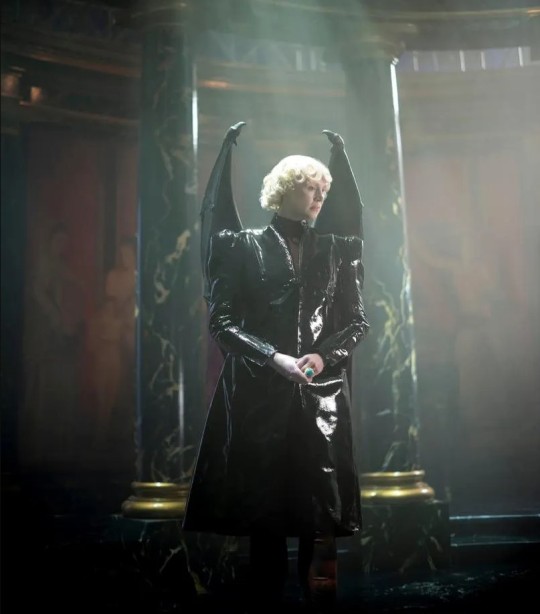
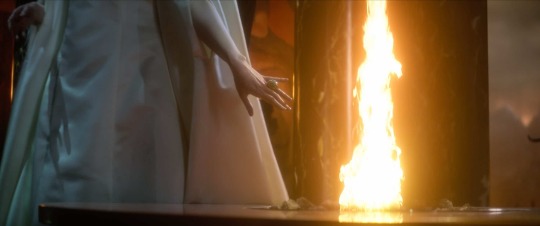

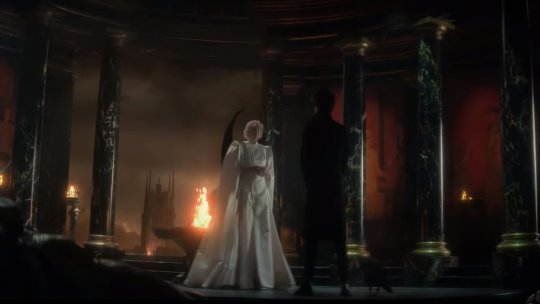
Gwendoline Christie as Lucifer (The Sandman series on Netflix, out 5th August 2022)
#lucifer#lucifer morningstar#thesandman#sandman#mythology#arthistory#angels in art#characters#neil gaiman#gwendoline christie#comics#thranduil#elves#folklorist#luciferian#occult#occultism#witch#magick#esoteric#myths#myth#folklore#rant#gender#netflix#netflix series#anthropology#androgyny#theoccultinpopularmedia
6K notes
·
View notes
Photo
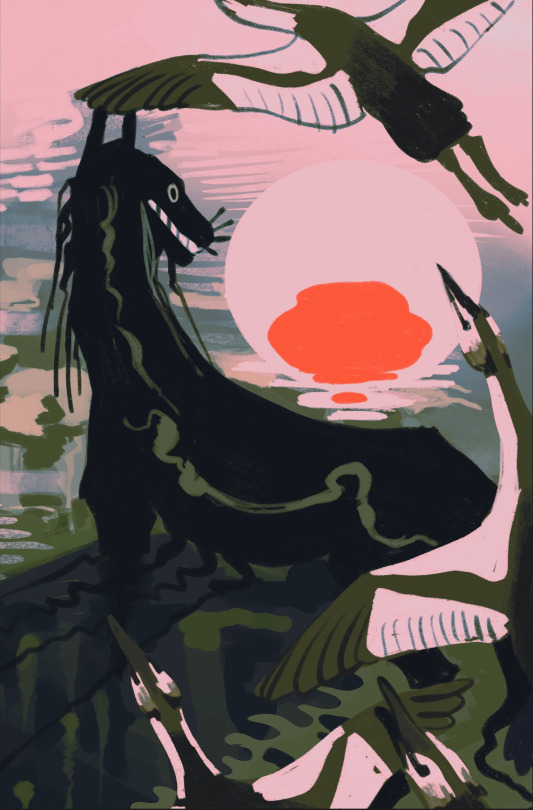


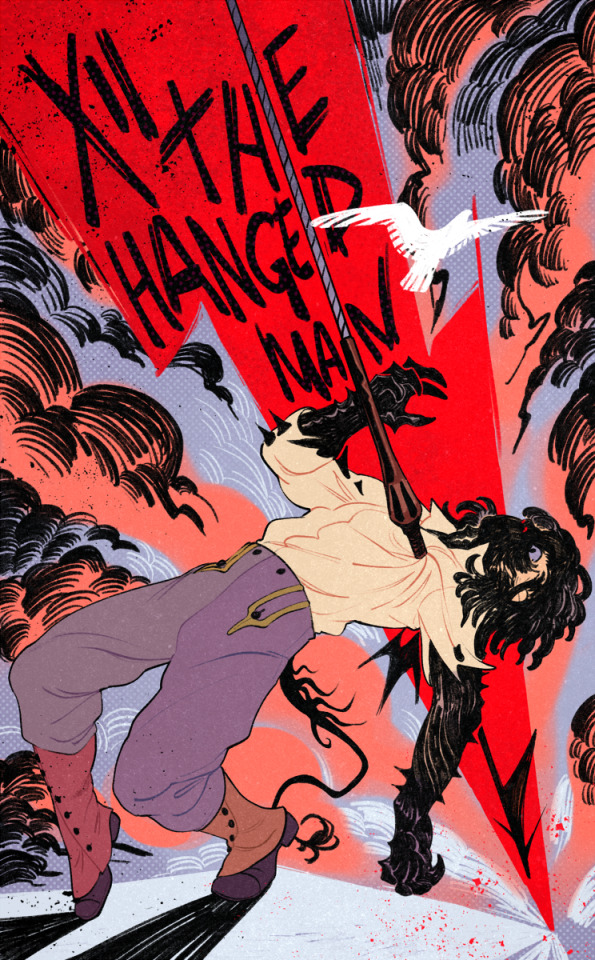
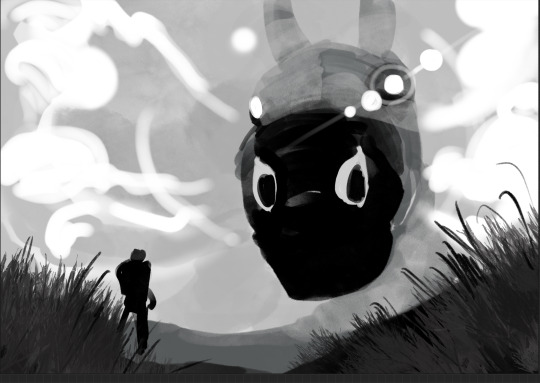
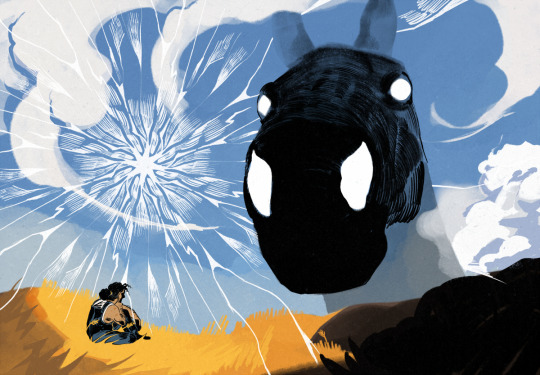
WIPs of some of my drawings where i made a full little painting for the sketch to nail colours or values first. i thought it would be fun to do a Behind The Scenes and also show u how some drawings changed, what i kept and what i discarded and at what point i just started adding unplanned details
all these were done using a mixture of sai and procreate
more comments on The Process under the cut
eye of the otherworld is inspired by a real photo i took two weeks ago!

i soooo wanted to draw water that looked like this, weeds and all, so the original colours of that sketch were picked direct from the photo. but i wasn’t satisfied with it so i changed it using a gradient map (you can see it’s crunchy on the borders between colours). for the final, i re-painted everything again using the sketch colours as a guide so that i would not end up with the crunchy edges a gradient map will give u, and so that i could add in extra contrast over the top. the black swirl pattern in the final was an ad lib lol but i’m really happy with how it gives the impression of water or liquid even if it’s not realistic... i will try again to recreate something like this photo tho because i am obsessed. the birds were originally swans but the necks were driving me crazy i needed a bird with a shorter neck and grebes are associated with this location in canon so it was perfect. they have very funny feet. the last detail i added to this was the white flashes in their primary flight feathers (which do not occur in nature btw)
hanged man was an interesting one because it’s based on a sketch i made in 2020 when i first wrote this fun impalement scene
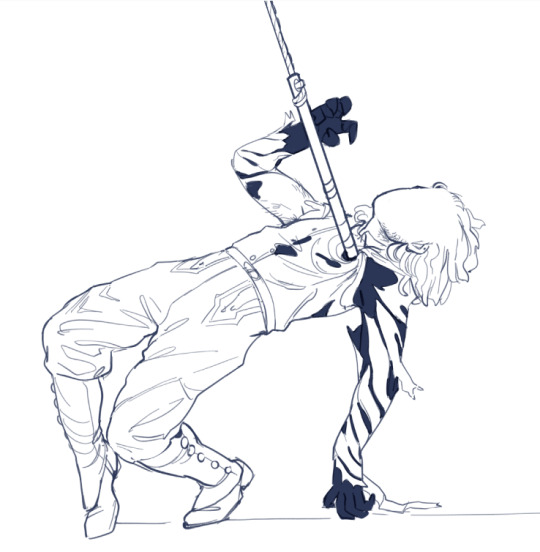
here is félix being impaled for the first time in 2020 by a rusted harpoon that essentially rips his human disguise off to reveal the black carapace underneath
for the coloured sketch in the photoset i re-lined this exact sketch in sai to update it to match my current lineart style, but as you can see i realised the pose itself needed work and not just a re-line so i completely redid it in procreate to exaggerate the pose and gestures. i went into this one already knowing exactly what bg colours i wanted so that was no issue but the hardest part was weirdly figuring out what he was going to be standing on. in canon he is standing on top of a very high wall and leaning back over a fatal drop. the black pencil lines in the clouds and the bird were ad libbed but i liked the idea of throwing the bird in as some extra symbol of freedom the likes of which you will not experience if you have been shot with a harpoon. the green was not working at all so the swap out to more purpley pink tones was last minute. i unified the different colours by using a colour-shifting brush (you’ll see that his gaiters are different colours - i didn’t hand pick those, the colour jitter did)
for Big Pascal... originally it was going to be a confrontation between the guy on the ground and pascal but i wasn’t feeling the standing pose and it ended up being... if not restful then at least maybe a little more benevolent than the shadow of colossus shit it was before. the white cracks in the sky were originally going to be black but it just didn’t work. a lot of people tag this one as some form of cowboy aesthetic which is funny to me. there’s no cowboys here
i do like the lens flare effect in the b&w thumbnail tbh and i think i kind of lost the low camera angle effect in the final
i drew a bonus comic of the two characters interacting during this scene (mostly the lil guy just trying to ignore what’s happening in the sky)
4K notes
·
View notes
Text
Paradise Lost: How John Milton's 1667 work influenced "Hazbin Hotel"
I've been thinking about why the "fruit of knowledge" in Hazbin Hotel is depicted as an apple, as opposed to another fruit that would've been more accurate to the Middle East during the Fall of Man, as well as how Paradise Lost by John Milton (1667) influenced the show.
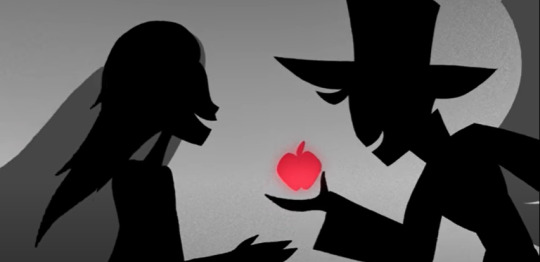
Per one source:
"Because the Hebrew Bible describes the forbidden fruit only as 'peri', the term for general fruit, no one knows [what exactly type of fruit it was]. It could be a fruit that doesn't exist anymore. Historians have speculated it may have been any one of these fruits: pomegranate, mango, fig, grapes, etrog or citron, carob, pear, quince, or mushroom."
Per Wikipedia:
"The pseudepigraphic Book of Enoch describes the tree of knowledge: 'It was like a species of the Tamarind tree, bearing fruit which resembled grapes extremely fine; and its fragrance extended to a considerable distance. I exclaimed, How beautiful is this tree, and how delightful is its appearance!' (1 Enoch 31:4)."
In Jewish and Islamic traditions, the "fruit of knowledge" is commonly identified with grapes. The Zohar explains that Noah attempted (but failed) to rectify the sin of Adam by using grape wine for holy purposes. Today, the "Noah grape" is still used to make white wine.

Furthermore:
"The association of the pomegranate with knowledge of the underworld as provided in the Ancient Greek legend of Hades and Persephone may also have given rise to an association with knowledge of the 'otherworld', tying-in with knowledge that is forbidden to mortals. It is also believed Hades offered Persephone a pomegranate to force her to stay with him in the underworld for 6 months of the year. Hades is the Greek god of the underworld, and the Bible states that whoever eats the forbidden fruit shall die."
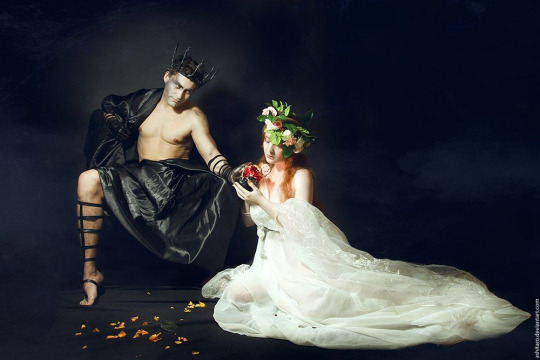
So, how then did the apple become the foremost symbol of the "fruit of knowledge"? You can partly thank Paradise Lost by English poet John Milton, a work which the lore of Hazbin Hotel is based off of.
Milton published the book in 1667, a time when the hedonistic Restoration era was in full swing. The exiled King Charles II was restored to the throne as King of England in 1660, and was a party animal, with dozens of mistresses, and nicknamed both the "playboy prince" and "Old Rowley", the latter after his favorite lustful stallion.
However, the association of the "fruit of knowledge" began with a Latin pun long before Milton immortalized the association in Paradise Lost. Per the linked article above by Nina Martyris for NPR:
"In order to explain, we have to go all the way back to the fourth century A.D., when Pope Damasus ordered his leading scholar of scripture, Jerome, to translate the Hebrew Bible into Latin. Jerome's path-breaking, 15-year project, which resulted in the canonical 'Vulgate', used the Latin spoken by the common man. As it turned out, the Latin words for evil and apple are the same: 'malus'.
[...] When Jerome was translating the 'Tree of the Knowledge of Good and Evil', the word 'malus' snaked in. A brilliant but controversial theologian, Jerome was known for his hot temper, but he obviously also had a rather cool sense of humor.
'Jerome had several options,' says Robert Appelbaum, a professor of English literature at Sweden's Uppsala University. 'But he hit upon the idea of translating 'peri' as 'malus', which in Latin has two very different meanings. As an adjective, 'malus' means 'bad' or 'evil'. As a noun it seems to mean an apple, in our own sense of the word, coming from the very common tree now known officially as the 'Malus pumila'. So Jerome came up with a very good pun.'
The story doesn't end there. 'To complicate things even more,' says Appelbaum, 'the word 'malus' in Jerome's time, and for a long time after, could refer to any fleshy seed-bearing fruit. A pear was a kind of 'malus'. So was the fig, the peach, and so forth.'
Which explains why Michelangelo's Sistine Chapel fresco features a serpent coiled around a fig tree. But the apple began to dominate Fall artworks in Europe after the German artist Albrecht Dürer's famous 1504 engraving depicted the First Couple counterpoised beside an apple tree. It became a template for future artists such as Lucas Cranach the Elder, whose luminous Adam and Eve painting is hung with apples that glow like rubies.
Milton, then, was only following cultural tradition. But he was a renowned Cambridge intellectual fluent in Latin, Greek and Hebrew, who served as secretary for foreign tongues to Oliver Cromwell during the Commonwealth. If anyone was aware of the 'malus' pun, it would be him, and yet he chose to run it with it. Why?
Appelbaum says that Milton's use of the term 'apple' was ambiguous. 'Even in Milton's time the word had two meanings: either what was our common apple, or, again, any fleshy seed-bearing fruit. Milton probably had in mind an ambiguously named object with a variety of connotations as well as denotations, most but not all of them associating the idea of the apple with a kind of innocence, though also with a kind of intoxication, since hard apple cider was a common English drink.'
It was only later readers of Milton, says Appelbaum, who thought of 'apple' as 'apple', and not any seed-bearing fruit. For them, the forbidden fruit became synonymous with the 'malus pumila'. As a widely read canonical work, 'Paradise Lost' was influential in cementing the role of apple in the Fall of Man story."
To tie this back into John Milton's relationship with King Charles II of England, as mentioned, Milton originally served Oliver Cromwell, Lord Protector of England, and the English Commonwealth, which was formed with the overthrow and execution of King Charles I on 30 January 1649, following the bloody English Civil War (1642 – 1651).
The King's two sons - the newly-christened King Charles II, the elder, and James, Duke of York (King James II), the younger - fled into exile on the European continent. However, with the death of Oliver Cromwell on 3 September 1658 came the 2-year-long dissolution of the English Commonwealth, and the restoration of the monarchy.
As for Milton himself, we can look to an article by Bill Potter.
Milton, born on 9 December 1608, was around 51-52 years old when King Charles II was restored to the throne. He attended Christ's Church, Cambridge in his youth, and mastered at least six languages, as well as history and philosophy; making him, perhaps, the most knowledgeable poet in history. He spent more than a year travelling across Europe, conversing with and learning from intellectuals, linguists, poets, and artists, including the famous Galileo Galilei.
However, Milton was a controversial figure of his time, being unafraid to criticize institutions of authority; arguing that "divorce was Biblical", for which he was routinely condemned; joining the Puritans; penning the Areopagitica, a treatise on liberty in favor of Parliament and the Roundhead rebels, during the reign of King Charles I, arguing that the King must be held accountable by the people; and agreed with and justified the murder of King Charles I, for which Parliament hired him in 1649 as a propagandist and correspondence secretary to foreign powers, on account of his fiery manifestos against "the man".
The collapse of the Commonwealth with the death of Oliver Cromwell in 1658 did not deter Milton from continued political writing against the monarchy and the new public sentiment that brought about its Restoration under King Charles II in 1660. On the contrary, Milton - now totally blind, having lost his eyesight by the age of 44 in 1652, a decade earlier - began writing Paradise Lost in 1661, and spent the next six years dictating the work to transcribers.
A supporter of regicide, Milton was also forced into exile himself, and faked his own death, as Charles refused to pardon - and sought to execute - any of those directly involved with his father's murder. Milton's friends held a mock funeral for Milton on 27 August 1660, just months after the coronation of King Charles II on 23 April 1660.
King Charles II commented that he "applauded his [Milton's] policy in escaping the punishment of death [execution for treason] by a reasonable show of dying", but insisted on a public spectacle nonetheless by having Milton's writings burned by the public hangman.
After eventually obtaining a general pardon from King Charles II, Milton was imprisoned, and released, likely due to political friends in high places. He died, aged 64, in 1674. His theological views were sometimes considered heterodox by the best Puritans, and his political views came close to getting him executed on several occasions. His poetry, however, has endured as some of the greatest works in the English language, especially Paradise Lost; much of his greatest work was written during his 22 years of complete blindness.
One of the main factors in King Charles II deciding to grant a pardon to Milton was, ironically, Paradise Lost. While originally written by Milton as a scathing criticism of King Charles II and the monarchy - depicting Lucifer Morningstar as a sympathetic rebel against God, with King Charles II claiming that is right to rule came from "divine ordainment" - Charles II enjoyed the work, and authorized its publication on 20 August 1667. We know this because a 1668 copy of Paradise Lost in royal bindings by Samuel Mearne, bound lovingly in a fine red leather made of goat skins tanned with sumac, and stamped in gold with the royal cypher of King Charles II, was found. The endpapers bore a watermark with the royal arms of Charles II.
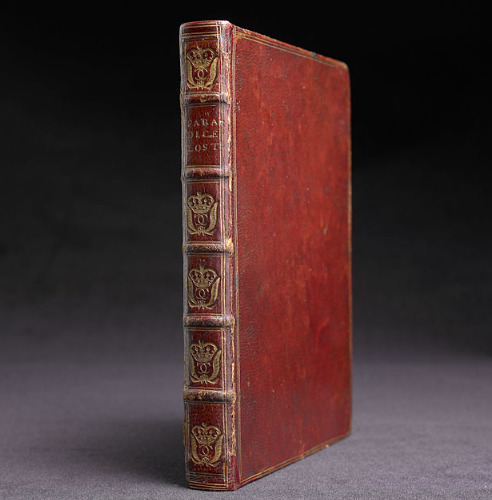
Per one Miltonian scholar: "The most single important event in Milton's life was the event against which he struggled most: the Restoration of Charles II, [and his relationship with the King]. Had it not come, we might have never had Paradise Lost...certainly, we should never have had [it] in [its] present power and significance."
Milton followed up Paradise Lost with Paradise Regained in 1671, three years before his death, with advice for King Charles II, urging the hedonistic Charles to "reign over himself and his passions":
"For therein stands the office of a King, His Honour, Vertue, Merit and chief Praise, That for the Publick all this weight he bears. Yet he who reigns within himself, and rules Passions, Desires, and Fears, is more a King; Which every wise and vertuous man attains: And who attains not, ill aspires to rule Cities of men, or head-strong Multitudes, Subject himself to Anarchy within, Or lawless passions in him which he serves." - John Milton, Paradise Regained, Book II, lines 463-472
To summarize: "If we must have a King back again, my Lord, please try to be a good man, unlike your father, who fell to his pride, [which was also the downfall of Lucifer]."
To quote another source: "Though the passage begins by noting that the office of a King is to bear the weight of public concerns, it is the control of one's private concerns that truly set a King apart as a virtuous character. Indeed, so important is self-command that any wise or virtuous man who attains it is like a king; any king who does not practice [self-command] is nothing more than a mere subject, ruled by anarchy and lawlessness."
Milton's words, too, echo a work written by Charles' grandfather, King James VI/I of Scotland and England: Basilikon Doron ("Royal Gift").
Per Wikipedia:
"'Basilikon Doron' (Βασιλικὸν Δῶρον) means 'royal gift' in Ancient Greek, and was written in the form of a private letter to James' eldest son, Henry, Duke of Rothesay (1594–1612). After Henry's death, James gave it to his second son, Charles, born 1600, later King Charles I. Seven copies were printed in Edinburgh in 1599, and it was republished in London in 1603, when it sold in the thousands.
This document is separated into three books, serving as general guidelines to follow to be an efficient monarch. The first describes a king's duty towards God as a Christian. The second focuses on the roles and responsibilities in office. The third concerns proper behaviour in daily life.
As the first part is concerned with being a good Christian, James instructed his son to love and respect God as well as to fear Him. Furthermore, it is essential to carefully study the Scripture (the Bible) and especially specific books in both the Old and New Testaments. Lastly, he must pray often and always be thankful for what God has given him.
In the second book, James encouraged his son to be a good king, as opposed to a tyrant, by establishing and executing laws as well as governing with justice and equality, such as by boosting the economy. The final portion of the Basilikon Doron focuses on the daily life of a monarch.
All of these guidelines composed an underlying code of conduct to be followed by all monarchs and heads of state to rule and govern efficiently. James assembled these directions as a result of his own experience and upbringing. He, therefore, offered the 'Basilikon Doron' ('Royal Gift') to his son, with the hope of rendering him a capable ruler, and perhaps to pass it down to future generations.
Overall, it repeats the argument for the divine right of kings, as set out in 'The True Law of Free Monarchies', which was also written by James. It warns against 'Papists' (Roman Catholics) and derides Puritans, in keeping with his philosophy of following a 'middle path', which is also reflected in the preface to the 1611 King James Bible. It also advocates removing the Apocrypha from the Bible."
King James VI/I further instructed his son and grandson:
"A good monarch must be well acquainted with his subjects, and so it would be wise to visit each of the kingdoms every three years."
"During war or armed conflict, he should choose old-but-good captains to lead an army of young and agile soldiers."
"In the court and the household, [a royal] should carefully select loyal gentlemen and servants to surround him. When the time came to choose a wife, it would be best if she were of the same religion and had a generous estate. However, she must not meddle with governmental politics, but perform her domestic duties."
"As for inheritance, to ensure stability, the kingdom should be left to the eldest son, not divided among all children."
"Lastly, it is most important...that [a royal] would know well his own craft...to properly govern over his subjects. To do so, [one] must study the laws of the kingdom, and actively participate in the council. Furthermore, [one] must be acquainted with mathematics for military purposes, and world history for foreign policy."
"[A royal] must also not drink and sleep excessively. His wardrobe should always be clean and proper, and he must never let his hair and nails grow long. In his writing and speech, he should use honest and plain language."
King James VI/I further supplemented Basilikon Doron with a written treatise titled The True Law of Free Monarchies: Or, The Reciprocal and Mutual Duty Between a Free King and His Natural Subjects.
"It is believed King James VI/I wrote the tract to set forth his idea of absolutist monarchism in clear contrast to the contractarian views espoused by, among others, James' tutor George Buchanan (in 'De Jure Regni apud Scotos'), [which] held the idea that monarchs rule in accordance of some sort of social contract with their people. James saw the divine right of kings as an extension of the apostolic succession, as both not being subjected by humanly laws."
Milton's own Areopagitica was a follow-up on De Jure Regni apid Scotos by George Buchanan, and also to The True Law of Free Monarchies, as well as the idea of the "divine right of kings". It takes its title in part from Areopagitikos (Greek: Ἀρεοπαγιτικός), a speech written by Athenian orator Isocrates in the 4th century BC.
Most importantly, Milton also wrote on the concept of free will: "Milton's ideas were ahead of his time in the sense that he anticipated the arguments of later advocates of freedom of the press by relating the concept of free will, and choice to individual expression and right."
The concept of free will, too, was a major topic explored in Paradise Lost. Per one source: "In 'Paradise Lost', Milton argues that though God foresaw the Fall of Man, he still didn't influence Adam and Eve's free will. [...] God specifically says that he gives his creatures the option to serve or disobey, as he wants obedience that is freely given [or chosen], not forced. Some critics have claimed that the God of the poem undercuts his own arguments; however, Milton did not believe in the Calvinistic idea of 'predestination' (that God has already decided who is going to Hell and who to Heaven), but he often comes close to describing a Calvinistic God. God purposefully lets Lucifer (Satan) escape Hell, and sneak past Uriel into the Garden of Eden, and basically orchestrates the whole situation so that humanity can be easily ruined by a single disobedient act. In describing the Fall of Man before it happens, God already predicts how he will remedy it, and give greater glory to himself by sending his Son [Jesus Christ] to die, and restore the order of Heaven."
In Hazbin Hotel, Adam also describes the Calvinistic idea of 'predestination', and that "the rules are black and white":

However, "This possible predestination leads to the theory of the 'fortunate fall', which is based on Adam's delight at learning of the eventual coming of the Messiah [from his bloodline]. This idea says that God allowed the Fall of Man, so that he could bring good out of it, possibly more good than would have occurred without the Fall, and be able to show his love and power through the incarnation of his Son. In this way, the free will of Adam and Eve (and Lucifer/Satan) remains basically free, but still fits into God's overarching plan."
However, there is one major flaw with this, and that is that we don't know if Jesus Christ exists within the Hazbin Hotel universe or not. Yet Charlie Morningstar, the daughter of Lucifer Morningstar and Lilith, and the "Princess of Hell", is depicted as a savior-esque figure within the show who, like God in Paradise Lost, encourages lowly sinners to choose obedience to God out of their own free will. More interestingly, Charlie does not come from Adam's bloodline; yet, while Lucifer decries 'free will', Charlie supports 'free will' instead.
Perhaps is is merely because Charlie, being the daughter of Lucifer and Lilith, claims to want to fulfill Lilith's "dream" of humanity being empowered in Hell ("The mind is its own place, it can make Heaven out of Hell, or Hell out of Heaven" - Lucifer, Paradise Lost); however, I think it also stems from Charlie having a genuine belief that 'free will', and people choosing to do good instead of evil, is "good" and "Godly".
True to Paradise Lost, this is also in fulfillment of God's plan; and, according to one fanfiction, why God allowed Charlie to be born to Lucifer and Lilith, so that sinners may be redeemed through Charlie.
For more on differing interpretations of 'free will', I suggest reading: "Free Will and the Diminishing Importance of God's Will: A Study of Paradise Lost and Supernatural" by Kimberly Batchelor (2016)
Excerpt: "'Paradise Lost' –and Milton’s purpose for writing the poem— is rooted deeply in postreformation Arminianism and this is apparent in its employment of free will. Chapter 1 argues that Milton turns to free will as a tool to justify the actions of God. Freedom of choice is God-given, and sets up a morality in which right and wrong are dictated by God. Chapter 2 shows that in 'Supernatural', free will is not given by a higher power; and, in fact, free choice functions as an act of defiance against God's will."
This raises the question: Is 'free will' given by God, using Lucifer as his vessel, in Hazbin Hotel, as in Paradise Lost? Or is 'free will' not given by a higher power; and, in fact, an act of defiance against God?
This brings us back around to our first question: Why is an apple, or 'malus', used to depict the "fruit of knowledge", especially if 'malus' means 'bad or evil', whereas Milton depicts 'free will' as God-given?
Well, for one, Lucifer still chooses to associate himself with apple symbolism and imagery, despite being skeptical of free will:
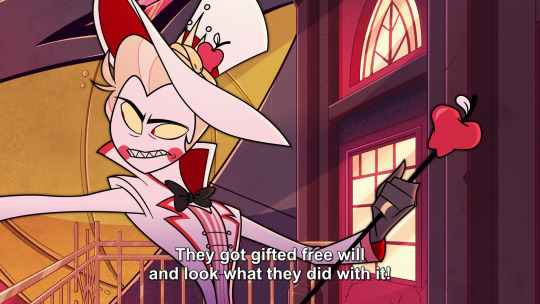
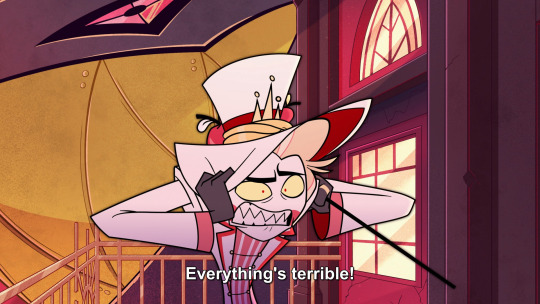
Based on the introduction to Episode 1, Charlie also views 'free will' as a gift (Miltonian), whereas Lucifer appears to view it as a curse.
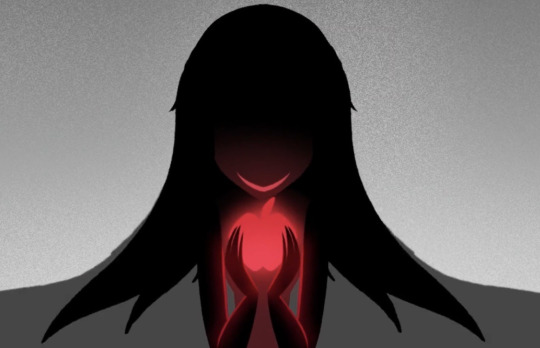
However, Charlie also notes that it was through the 'gift' of free will that the "root of all evil" entered the world, for if mankind could choose to be good, then they could also choose to be evil ('malus').
John Milton states in Paradise Lost: "Of Man's First Disobedience, and the Fruit Of that Forbidden Tree [malus], whose mortal taste Brought Death (evil, malus) into the World, and all our woe."
Thus, the use of an apple specifically is likely a tie-in to what others have been speculating about a character that series creator Vivienne Medrano (Vivziepop) alluded to a while back: "The Root of All Evil".
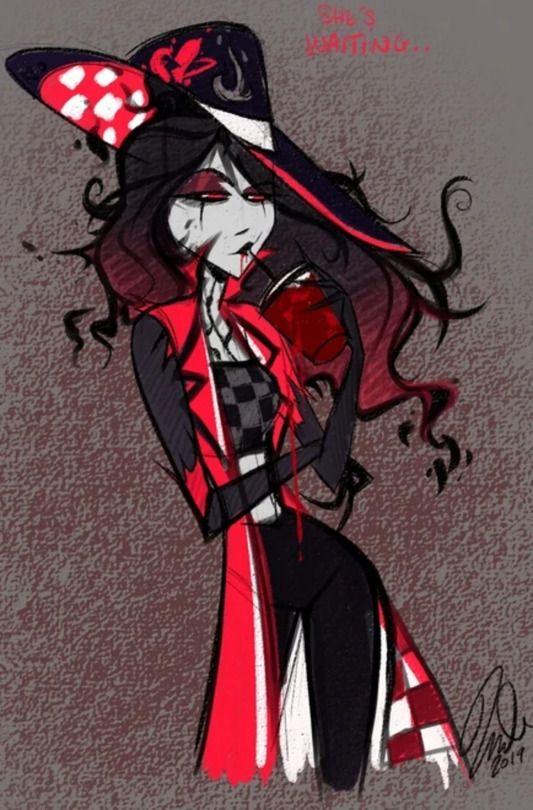
However, "Roo" itself is depicted as possessing the body of a human woman, presumably Eve, the first one to eat the "fruit of knowledge":
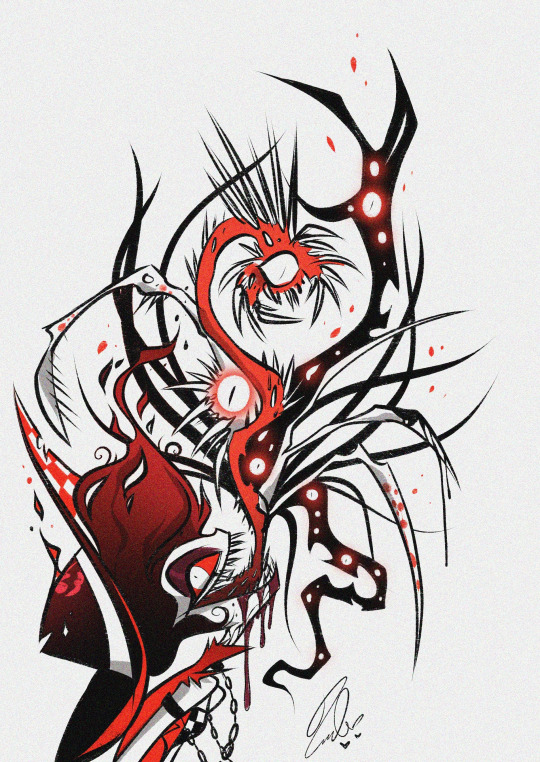
Thus, we can discern that "Malus" likely refers to this character. (Also see: "Maleficent", a name that also uses the root word "mal", "evil".) As for Roo's intentions, if Charlie is "good" - and, if, in fact, Alastor was sent by "Roo" (Eve) - then they may want for Alastor to work on their behalf to "corrupt" Charlie, or make sure the hotel never succeeds.
This is because demonic power is tied to human souls, and there are "millions of souls" in Hell, which likely fuels the great power of "Roo". The more souls there are in Hell, the more powerful "Roo" becomes. The Overlords also get their demonic power from "millions of souls".
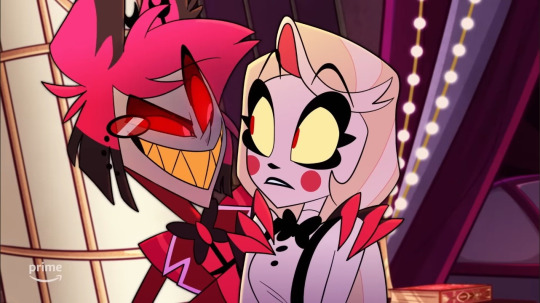
The deal between Eve and "Roo" might even be the first contract, or deal, between a human soul and a demonic entity; in exchange for 'free will', and the knowledge of good and evil, Eve allowed the "Root of All Evil" to inhabit her body, and to escape the void or prison it was confined to by Heaven (Hell?). (For one cannot be 'all-good' unless you attempt to 'eliminate' or 'ablate' evil; and, in Greek mythology, Zeus imprisoned the Titans in Tartarus for all of their evil deeds.)
Another possibility, brought up in an article by Gillian Osborne, is that Lucifer sees the "fruit of knowledge" as an apple, but it may appear as different fruits to different people, depending on how they view it. This also fits with Lucifer and angels being able to easily shapeshift.
In Paradise Lost, only Lucifer describes the fruit as an "apple" (malus), as he associates malus with "bad, evil", while the narrator also describes the fruit as "a mix of different colors" and peach-like. This then begs the question: "Did the fruit of knowledge of good and evil become 'evil' because Eve harbored resentment towards Adam?"
Quote: "Lucifer (Satan) gives Eve yet another hint that this tree may be more complicated than he wishes her to believe: although elsewhere in Milton's poem Eden is heady with its own newness, sprouting spring flowers left and right, the tree of knowledge is already old: its trunk is 'mossie'. Nevertheless, Lucifer claims to wind himself around the tree 'soon'; the quickness of his reported arrival stands in contrast to the timescales required to cover a fruit tree with moss (PL 9.589). Placing Lucifer's winding body between these two timescales—an easeful present and the inhuman scale of natural history—Milton suggests that there is something dangerous in entangling the past with the present. Yet, 'Paradise Lost' also makes deep biblical history feel like present politics for its readers. When Adam and Eve wander out of Eden at the end of the poem, they famously make their way not only into an earthly paradise, but also into the present. Eden's mossy apple tree therefore represents the pitfalls of conflating nature and history, of seeing any action in human history—even Eve's eating of an apple—as natural, if by nature, we mean inevitability. For Milton, history, unlike nature, is directed by humans, progressive, and, like the reading of 'Paradise Lost', hard work. While trees may inevitably collect moss the longer they live, Adam and Eve's labors in the garden, and our labors of reading, require agency and effort. Milton's poem refuses mourning the loss of Eden, [and the perfection of Heaven], in favor of a perpetual, melancholic, recreation of paradise: a present perfecting."
To quote Twisted: The Untold Story of a Royal Vizier, which also draws inspiration from John Milton's Paradise Lost: "It's an unfortunate situation...but you do have a choice [i.e. free will]."
#hazbin hotel#hazbin hotel analysis#hazbin#hazbin analysis#hazbin hotel meta#hazbin meta#hazbin hotel theory#hazbin theory#deep thoughts#john milton#paradise lost#eve hazbin hotel#lucifer hazbin hotel#lucifer morningstar#adam hazbin hotel#lilith hazbin hotel#lilith morningstar#roo hazbin hotel#root of all evil
220 notes
·
View notes
Note
What are the three ghosts of Christmas like in the other world canon. I believe jacob Marley worked tooth and nail to get them to help Scrooge and Is the ghost of Christmas yet to come an aspect of death

I call them the "Three Santas" in my Otherworld canon.
The Ghost of Christmas Past is the spirit of Saint Lucy, chosen due to her association with light and sight, as well as her holiday being in mid-December.
The Ghost of Christmas Present was always going to be obvious. Dickens based him on Father Christmas, an English folk figure that evolved from pagan traditions who later merged with Saint Nicholas.
And finally, keeping with the theme of choosing saints, it only made sense I find one that personified death in some fashion in order to represent the Ghost of Christmas Yet to Come. The mexican folk saint Santa Meurte seemed like a perfect, albeit somewhat out of place, fit.
#ask#tales of the otherfolk#my art#saint#saint lucy#saint nicholas#santa muerte#folklore#worldbuilding#mythology#a christmas carol#ghost of christmas present#ghost of christmas past#ghost of christmas future#ghost of christmas yet to come#santa claus#christmas#christianity#paganism
102 notes
·
View notes
Text

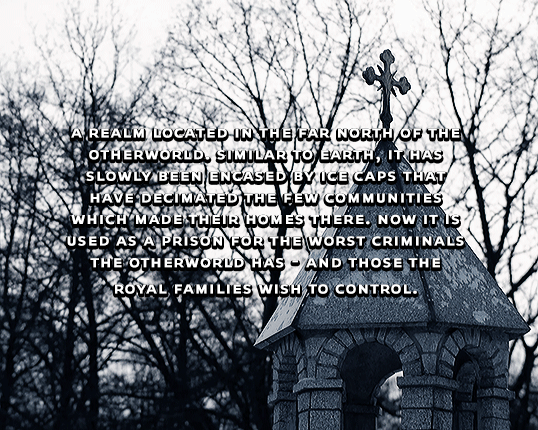




A LOOK INTO THE OTHERWORLD'S REALMS:
P for Polaris
a realm located in the far north of the otherworld. similar to earth, it has slowly been encased by ice caps that have decimated the few communities which made their homes there. now it is used as a prison for the worst criminals the otherworld has - and those the royal families wish to control.
@winxsource
#polaris#fate the winx saga#ftws#fatethewinxsagaedit#ftwsedit#gifs#gif#*mine#otherworld realms tag#ish tag#userzackmartin#just putting a disclaimer that is all hc#pls no comments abt how its not canon or canon has been changed#you will be ignored lol
41 notes
·
View notes
Text
Let's talk about this.
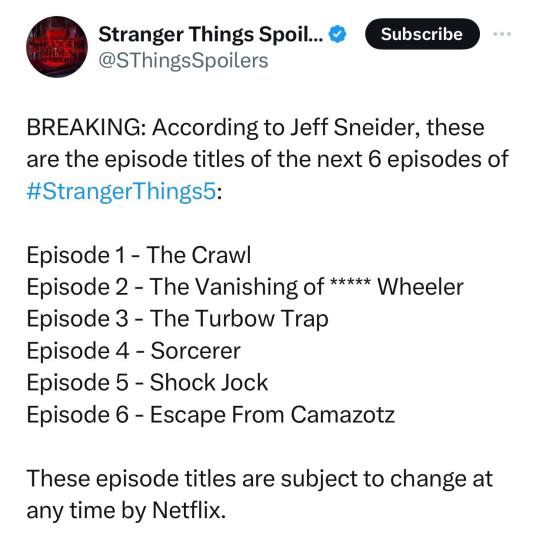
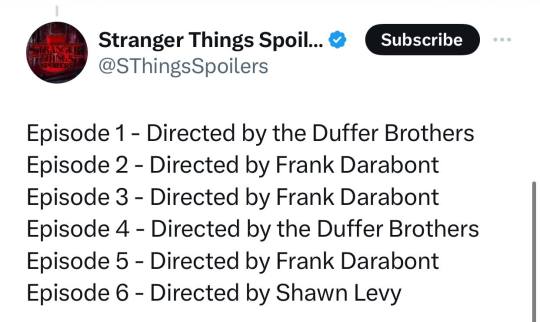
"The Vanishing of *** Wheeler." - So... Which Wheeler? Mike, Nancy, Holly? I'm leaning towards the last one, but! They all make sense. One can imagine how Vecna, could be after Mike, to at the same time, hurt Will, Al. Or, he could be using Mike as bait to lure them into a trap.
It's also conceivable that Vekna would come after Nancy for revenge because his plan didn't work out as planned, and Nancy, who knew more than anyone, almost killed him at the end of season 4.(But also, it would be as bait for others, a trap to lure them into the Otherworld.)
And the best part. What if it was Holly? Let's look back through all the seasons and realize the fact that she was somehow but connected to the Yznan, she saw a lot of things.
Season 1 - Holly was the one who went to the Byers house to get light bulbs and saw in Demogorgon style (saw somewhere a suggestion that it could even be Vekna, who even then wanted to kidnap her.).
Season 3 - On the Ferris wheel, Holly noticed that the trees were moving and apparently didn't believe her mom that it was the wind. I think Holly sensed something wrong, you know what they say, kids see more than adults.
Season 4 - We're shown that Holly is the first to notice ash from the sky, calling it snow. Once again, she's the first to notice something weird and it's not weird?
I think she's going to play a big role. Holly, Ted's favorite and father, Ted even fell asleep with her in his arms. We're told that Ted and Mike will have some kind of interaction, so why wouldn't it be a conversation like Ted is worried and starts asking Mike what the heck has been going on for years and where is the youngest daughter missing? Also, Holly's disappearance could strengthen the family as everyone will be on the lookout for the girl.
"Escape from Camazotz" - I think this is going to be a clash of the Bylers. We all know that the Bylers will likely have some sort of tension, but we know that they will most likely be Endgame this season. There are rumors and theories that the Bylers will become canon in episode 7. I think this all makes sense since we haven't been given the title of the last two episodes because they could be a huge spoiler.
" Sorcerer." - I can very likely tell you what was going on in Yznanka with him 1983. We'll be shown this with flashbacks that may show Vecna for some purpose, perhaps to get him to his side and show how similar they all are. Also, maybe it will show us that Will has the ability to hear and sense Vecna. Because of that, everyone might be afraid of him, since he can play both sides, or even if it's not him anymore, they might be afraid of him being evil. Mike and Joyce will be reminded of the events of season 2 and assure them that Will is fine.
#byler#byler endgame#finn wolfhard#mike wheeler#byler brainrot#will byers#mike wheeler fanart#noah schnapp#stranger things 3#stranger things 4#stranger things 5#st5#stranger things#stranger things s5#joyce byers#holly wheeler#nancy wheeler#st5 spoilers
56 notes
·
View notes
Text
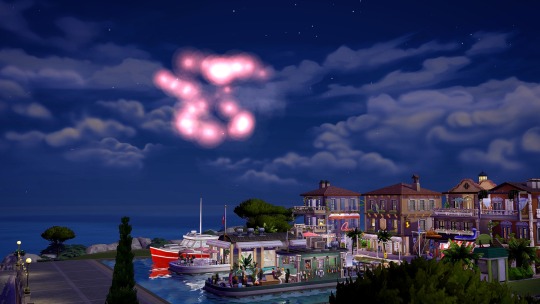

Beltane - Part 4
It all starts -> here (incl prequel)
The Boys spend a wonderful day together and it was so good to see Noxee again (and even Greg ;) They'd been on their own in the Otherworld (only with Arturo from time to time) for months now.
Time for the fireworks and 'traditional' (says Greg) Beltane Canons before Ji Ho's spell fades!
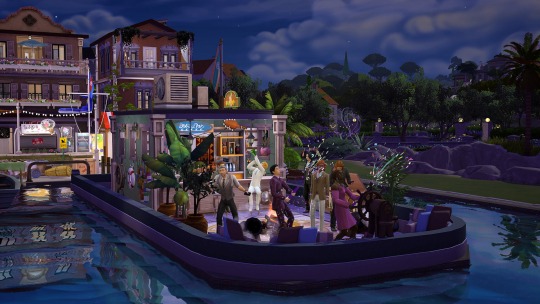

Noxee looks so beautiful.
(The way Greg looks at her <3)
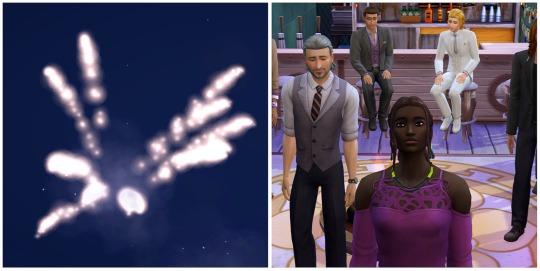
And then the 'traditional' Beltane Fire broke out!
(We also had a fire at Beltane last year...)
The whole Beltane 2023 episodes are -> here
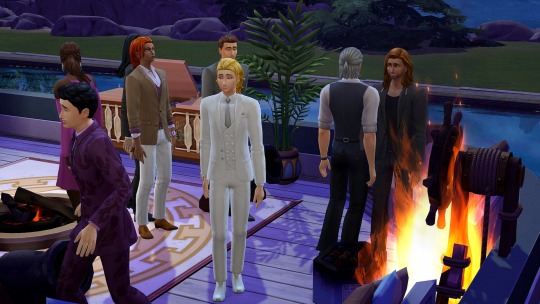
Greg to Jack: "Is this your fault?"
Jack: "What? No!"
(of course it is -.-)
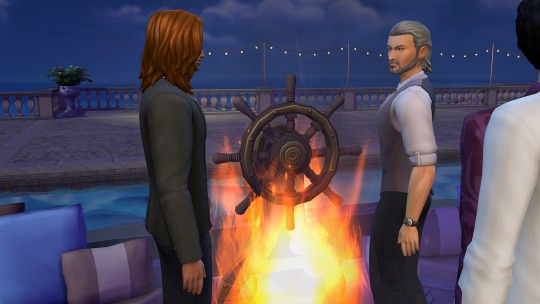
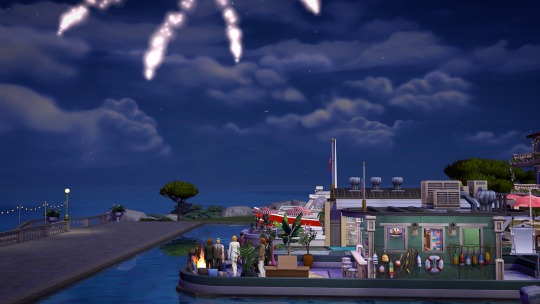
The spell faded slowly and it's time to part. Greg, Jeb, Kiyoshi and Vlad will stay here, at Hotel Elvis, and Noxee, Jack and Saiwa will spend the night at the Campeggio (campsite), where the Boys had spent their last summer holidays.
Before they left, Vlad went over to them to charge the Bond. He felt that Ji Ho will need more than the usual today because he is so exhausted from the ride and the spell.
But he wasn't with the others.
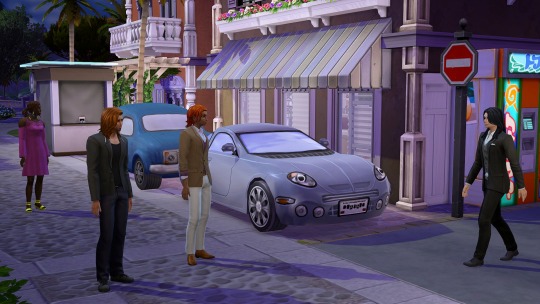
Vlad: "Where is he?"
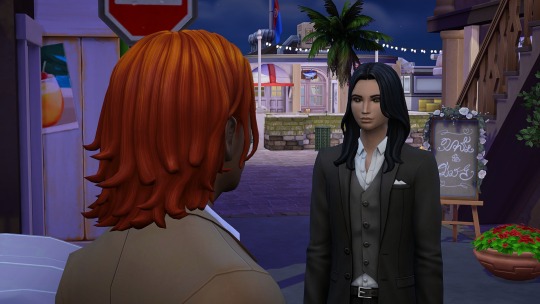
Saiwa: "We brought him to your room. He's too tired to make it all the way up to the campeggio. You will care for him. Properly."
Vlad: "What? I told you I wont go any further with him! The spell is still affecting me. If I have to be near him, alone with him - I am not that strong. When he tries to kiss me again..."
Saiwa: "He's your bonded and you already did anything imaginable with him! Ji Ho did everything so we can spend this day together! You know he's the most sensible of us and how much he suffers because we are apart from each other! We are going to do our best to be together again with the help from Tiny Can and the Therapy Game and until then, Ji Ho's well-being is your concern!"
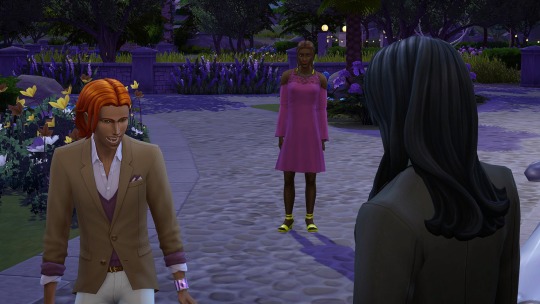
Saiwa: "Have a good night!"
Vlad to Jack: "Stay with us!"
Jack chuckles: "Vlad. I love you - but I won't do that. He needs you."
Saiwa: "Let's go, Jack!"
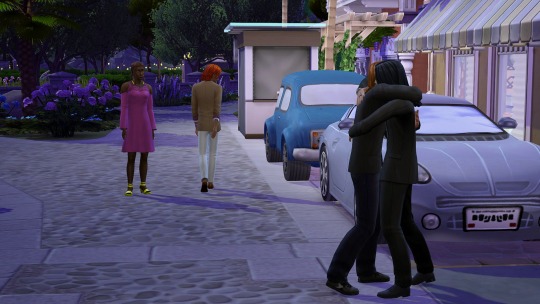
Vlad sighed and went upstairs to their room. He refuses to get physical with Ji Ho as long as he is not able to love him. But Vlad also knows how much Ji Ho longs for physical intimacy with him.
When Vlad entered the room, he found Ji Ho collapsed on the floor. He was so exhausted, he must have been trying to take a shower to hydrate but it wasn't enough. They need to charge the bond. Thoroughly.
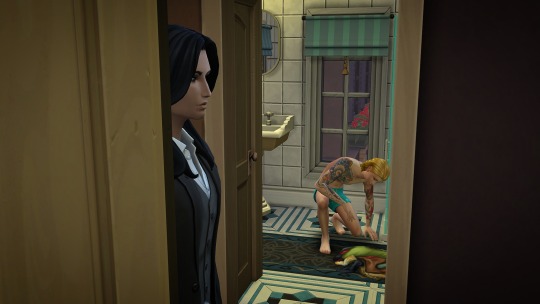
Ji Ho knows that Vlad is only reluctantly charging the Bond and refuses any interaction that involves anything romantic until he's able to love him.
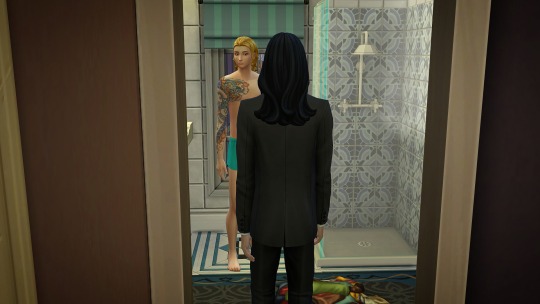
Vlad approached Ji Ho to embrace him to charge the Bond.
Ji Ho: "Vlad. This won't be enough - I tried everything to avoid it but I..."
Vlad: "Don't worry. Come."
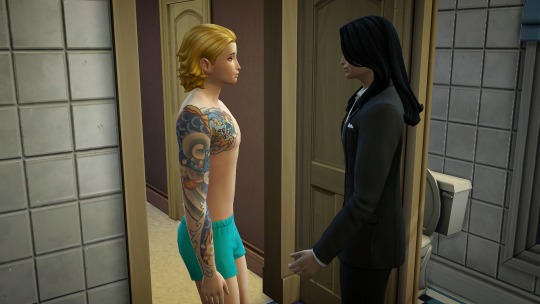
Ji Ho: "Forgive me."
Vlad: "Shh."

It's the same room where Jeb and Sai spent their second date!
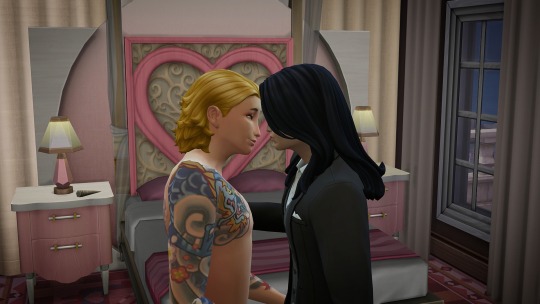
Ji Ho: "I will be yours, I promise."
Vlad: "I know. Don't worry. Do whatever is necessary for you to heal. I will be fine."
Ji Ho: "Wait for me."
Vlad: "Always."
(They are speaking of Ji Ho's ingame wedding with Caleb.)

'How many beautiful baths together and alter in the night
Close, close I shiver a bit
Don't try to deny that tonight, if I insist I will have you
So small and fragile you seem to me and I'm making a mistake
So small next to me. And fragile, or not.
But you're more strong than I am'
'Quanti bagni mozzafiato insieme e poi di sera
vicino vicino a me tremi un pò
Non cercare di negare che stasera magari se insisto io ti avrò.
Così piccola e fragile
mi sembri tu e sto sbagliando di più.
Così piccola accanto a me e fragile o no
ma in fondo sei molto più forte di me!'
Piccola e Fragile - Drupi

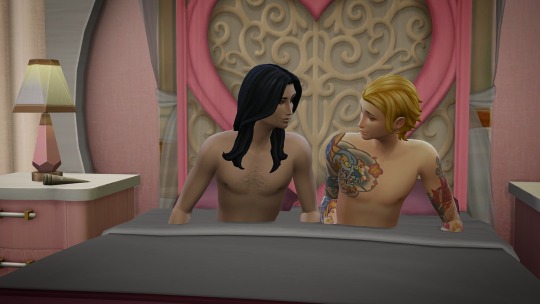


Outtakes
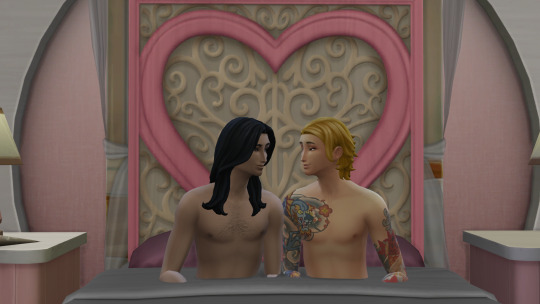
Here they laughed together <3
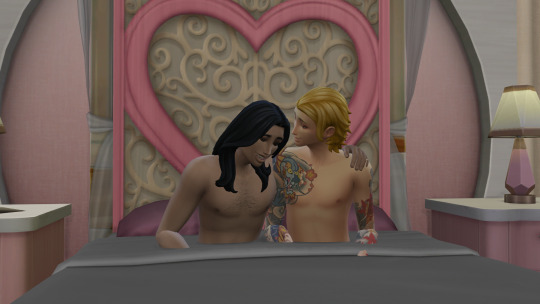
Until Ji Ho got a message from Leander ^^'
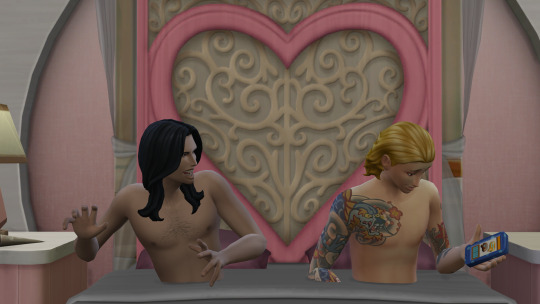
No festival without chaos...
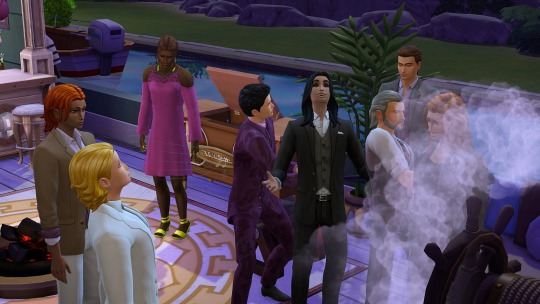
Them :3
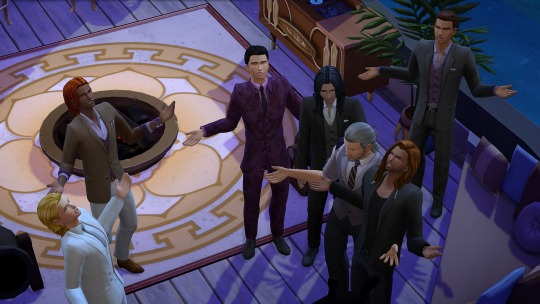
From the Beginning ~ Underwater Love ~ Latest
Current Chapter:
🕹️ 'The One' from the beginning ▶️ here
📚 Previous Chapters:
Chapters: 1-6 ~ 7-12 ~ 13-16 ~ 17-22 ~ 23-28
#therapy game#underwater love#saiwa#callahan pyromaniacs#jack callahan#jeb harris#vladimir tepesz#vlad funny#woo ji ho#kiyoshi ito#beltane 2024#jack hates greg#the game#jack pizza#vlad tepesz#giga byte#grexee#noxeema jackson#greg lunvik#Spotify#sims 4 vanilla#sims#ts4#sims 4 story#simlit#simblr#sims 4#show us your sims
54 notes
·
View notes
Text
Quick (n lazy) Breakdown of the pantheon of Gods & Goddesses in my muses' canon (pt. 1/idk bruv )

Below I've listed the main Baddies / most powerful rulers in the Otherworld, their titles, their domains, and what they're known for as well as their FCs. Some don't have FCS yet and more than likely I will change shit over time but this is to give you a rough idea of who the "all powerful" rulers of the universe are in my muses' canon. Once I make actual bio pages for them I'll go into more details about their relationships with the other gods and all that fun stuff.
Danu - High Queen of the faeries / head of the Tuatha dé Danann ( the people/children of the goddess Danu)
FC: Charlize Theron from Snow White and The Huntsman
Territory: all of Albios - AKA "the Heavens"
Ériu - Goddess of "the Isle" / Ireland
FC: undecided/open to suggestions
Territory: Tír na nÓg - paradise / "the land of youth, health, and beauty" & Bitu "world of the living beings"
Elatha - King of the Fomorians & God of the sun
FC: undecided / open to suggestions
Territory: Dunbos / The Hells
Delbáeth AKA Belenus - Fomorian King & God of Fire
FC: undecided / open to suggestions
Territory: Dunbos / The Hells
The Dagda - Chief/General of the gods
FC: Magnus Bruun Nielsen from The Last Kingdom
Territory: Mag Mell - land of greatness achieved through honorable death in battle
The Morrígan - Goddess Queen of war, magic, & death
FC: Anya Chalotra from The Witcher (main) Linda Cardellini (alt)
Territory: Mag Mell - land of greatness achieved through honorable death in battle
Lugh - Warrior King & God of the sun & arts
FC: Henry Cavill from The Witcher
Territory: Mag Mell - land of greatness achieved through honorable death in battle
Brigid - Goddess of Healing, Fertility & Protection
FC: Elle Fanning from Sleeping Beauty
Terriroty: Tír na nÓg - paradise / "the land of youth, health, and beauty"
Balor - High King / Leader of the Fomorians/enemies of the Tuatha dé Danann
FC: Ian McShane from American Gods
Territory: all of Dubnos - AKA "the Hells"
Manannán mac Lir - Warrior King / God of the sea
FC: Jason Mamoa
Territory: Mag Mell & Emain Ablach ( island paradise of the Otherworld )
Aengus - God of youth, summer, love, and poetry
FC: Aneurin Barnard
Territory: Tír na nÓg
#canon. | the otherworld *#canon. | the aos sí *#canon. | the seelie court *#canon. | the unseelie court *#canon. | world lore *#canon. | gods & goddesses *#canon & lore. | the fae *
3 notes
·
View notes
Text





YANDERE ! ORIGINAL CHARACTER PROFILE : MORI BAN
PROFILE STATUS: UNEDITED
Elements of this Character Profile is STC.
Keep in mind that all my OCs in this blog are from a shared universe and that the story/character elements might change as I work on the series. Some works here are also non-canonical to the character, and as such may contain a different plot/setting/character backstory entirely.

GENERIC INFORMATION:
NAME: MORI BAN
ALIASES: BOSS, BOSS MAN, THE DELINQUENT, WIFEY, STALKER, ALBINO LION, FAILURE, MOP HAIR, MULLET MAN
GENDER: MALE
SEX: TRANS-MASC
PRONOUNS: HE/HIM
BLOOD TYPE: AB
AGE: 21 (As of 1896)
BIRTHDAY: AUGUST 28 1875
HEIGHT: 6’8” (203cm)
WEIGHT: 250 lb (113kg)
HAIR COLOR: PALE TURQUOISE
EYE COLOR: MAGENTA
SKIN COLOR: IVORY
RELATIVES : The Ban Clan
— Ban Gabrielle (Descendant)
— 11 Siblings
— Parents
OCCUPATION: MILITARY STUDENT (formerly), REGULAR STUDENT.

Featured In:
Tumblr Works / As a Yandere Character :
— Hairpin | Popped
— 1K Celebration | Underwear
(note that the earlier stories are separate from his actual lore and are the connected at all to the comics he’ll feature in nor his backstory in the overview)
Comic Series :
— Make Money Not Love!
— Midnight Darling

OVERVIEW
Main Storyline ( In the Comics ) :
Mori comes from an extremely poor background. He’s the 8th out of all 12 siblings, and was only ever given attention to due to his hair and eye color presumably given to him by Celestial Tower [more on that in future, will link a separate post explaining the Tower].
As such he was forced into school despite wanting to help out by working instead. He’s faced with great pressure to graduate and eventually join the new Reconnaissance of the Otherworld • Special Unit ( RO•SU ロ•ス ). However, his mana was found out to be corrupted and he’s quickly dispatched (killed) on site.
He is reborn many centuries earlier as a delinquent, back before the Celestial Tower’s appearance. His arc on the comic “Make Money Not Love” is about his struggles with finances and the expectations of an Asian society that places value on monetary success.
Mori is abnormally tall. He used to be AMAB in his original timeline and his height (along with his hair and eye color) carried over despite the new biological sex. His height is presumed to also have come from the Celestial Tower since such an incredible height is rare not just from his family but the country he lived in.
Due to the value put on his looks (i.e. hair and eye-color) he abhors people touching him. Afraid that even the slightest change, or damage would affect his value as a person. Even in fights he makes sure that neither gets in harms way.
As a Yandere (for x you/reader people):
Now as a Yandere, Mori is extremely materialistic. Whether consciously or unconsciously, he likes when he’s given objects of value. He’s also extremely masochistic, as he likes to get into fights or annoy people for the sake of attention.
Mori has extremely low self esteem. The slightest bit of kindness will have him falling, but that feeling is usually fleeting unless the other person maintains their affection towards him.
If you’re to be his darling, you’d need to be extremely patient or at least be resistant to teasing. He can’t help it, he does it out of love, you see?
His ideal darling would be the type to be rude when it comes to words but soft when it comes to actions. A tsundere one might say. He’s also into the cool, collected types (but it would be even better if they insulted or beat him up once in a while)
His worse match would be a shy, demure, compliant darling. He enjoys challenges, thrills. His previous life basically wired him to enjoy hardships. If the Darling gave into him easily he’d find them boring.
Is probably the only yandere I’ll ever write that’s okay with being cucked. Might even like it a little too much.
Mussy.
Sub leaning switch.
[to be added upon]

GALLERY:
[to be added upon]

©️ hana.no.seiiki | yun. please do not redistribute, repost, translate this written / painted work without credit or permission.
#hns.txt💬#hns.ocprofile🪪#hns.moriban#make money not love#midnight darling#yandere#yandere x reader#yandere imagine#yandere oc#original character#yandere original character#oc x reader#oc profile#original character profile#yandere oc x reader#yandere oc x you#yandere oc imagine#yandere original character x reader#yan oc#yandere harem#yandere harem x reader#sub yandere#oc#oc art#original character art#illust#oc illust#artists on tumblr
259 notes
·
View notes
Text
Gambit, Mental Health & Trauma
(Prefacing this with this is my interpretation and analysis of Gambit as a character, past and current events. I've been a fan of roguegambit for over a decade- I love them both so much!!!!!)
Gambit is a character who has canonically experienced a lot of trauma- being abandoned by his parents, growing up on the streets, sold into slavery as a child, his first marriage failing, being exiled from his hometown, etc. (I could honestly go on for days.)
Yet, this is largely ignored by comic writers. In situations where his consent is violated, for example, it's brushed off as a silly haha, and he has no reaction to it whatsoever.
I think the reason his trauma is so unexplored is firstly, because he's a man, and secondly, a lot of these events happened in solo's written by men. Examples of this are Gambit (1999), when he was sold into slavery and Etienne died, as well as the Foxx storyline in X-Men (2004)- both were written by men.
Even in Astonishing X-Men (2017), after the Foxx storyline, Mystique claims -in a throwaway line- to have slept with Gambit presenting as twin sisters. His reaction is, "Wait, what? How?" and that's it. No one else in the group reacts, and it's never acknowledged again.
Personally, if I found out that the mother of my (ex-)partner, who sexually harassed me over an extended period of time in the past, had gone on to violate my consent in such a manner, I would be upset. To say the least.
It's only in more recent years that conversations about men's mental health and consent have begun to happen, so it's not much of a surprise to me (sadly) that events were ignored or brushed over in the past.
The reason for my pointing all of this out is in response to his characterisation in Rogue and Gambit (2023).
Thus far, rather than dealing with his trauma, Gambit has ignored it.
RG23 is the point where everything has caught up with him, and he doesn't know how to cope. I can understand why it might seem like he's suddenly being written as a completely different person- for a very emotionally-driven person, somehow, his trauma has never negatively affected him in the past.
However, to understand RG23, we need to revisit Knights of X (2022)- where Gambit's depression came to the forefront. In issue 1, we see Rogue has left a note stating, "Shug- Working late. Don't wait up - Cher". We see he's unhappy about this, it's not the first time, and it's what leads him to join KOX and travel to the otherworld. He's lonely.
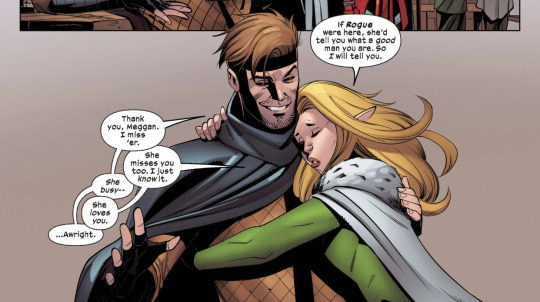
This panel from issue 2 tells us everything we need to know about Gambit's headspace at that point in time. He misses Rogue, he doesn't believe she misses him, and he doesn't believe she loves him anymore.
Gambit has always struck me as the kind of person who desperately wants to be loved, but does not believe he is worth loving. At the beginning of his relationship with Rogue, he wanted her to love him, but he couldn't let himself emotionally invest in her.
This could be attributed to a whole number of things, but I think it all comes down to low self-worth. We know Gambit doesn't think of himself as a good person, which leads to him willfully making bad decisions at times (self-destructive behaviour). We also know that when he loves, he loves with everything he has and more.
After his exile from New Orleans, Gambit chose to abandon Bella Donna instead of bringing her with him. I think, from his perspective, he'd done irrevocable damage to the peace between their families, not to mention killing her brother. He couldn't allow her to sacrifice everything just to be with him, so he left her. Why? Because he didn't believe he deserved her love and dedication.
I'm certain this is a mindset Gambit took to all of his relationships going forward. Flirting, flings, and one night stands are an easy way to feel important for a minute without the risk of someone truly knowing him and deciding he isn't worth their time.
I think this is why it took him so long to admit to Rogue (and himself) that he was in love with her. I think this is also why we've seen him completely give up on communicating with her between KOX and RG23.
If Gambit starts a conversation with Rogue about their relationship, he's opening himself up to rejection. We know from RG23 issue 2's Rogue interview that she would never reject him (from her perspective their marriage is fine), but he doesn't know that. To hear the one person he loves most in the world outright say she doesn't love him anymore... It would break him completely. So, Gambit avoids the conversation.
In KOX issue 3, Gambit essentially killed himself to save his team.
Now, consider his mindset: he's in the Otherworld because he thinks Rogue doesn't love him anymore.
I'm not saying that directly led to him killing himself- as I said, he did so to save his team. However, I think it's safe to say if his mental health was in a better place, he wouldn't have made such a decision, let alone have gone to the Otherworld to begin with.
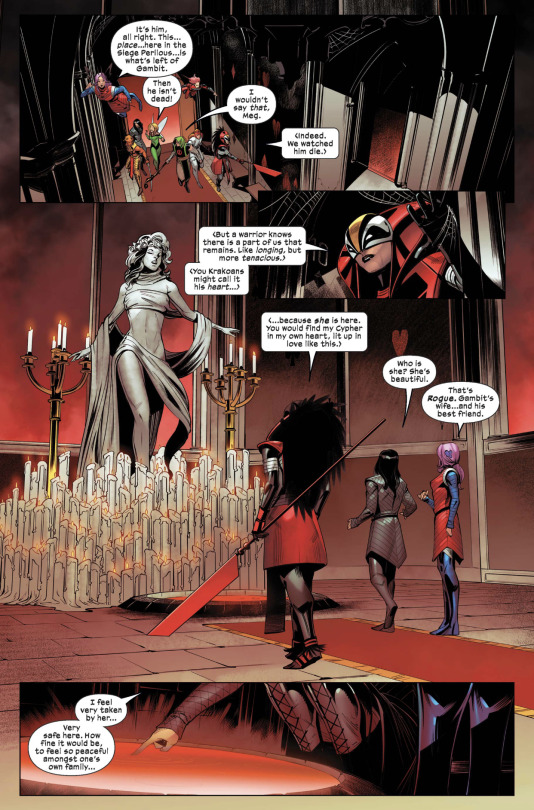
This page from KOX issue 5 highlights his feelings for Rogue. She's his heart. His reason to live. Compare her statue to all of his:
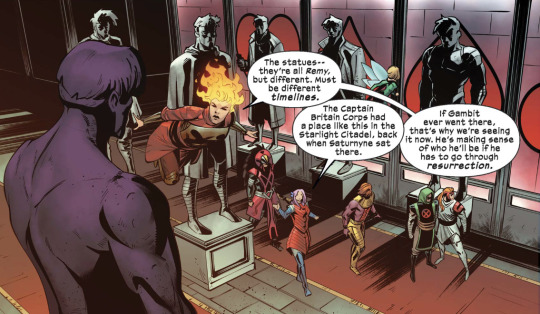
Rogue's statue is surrounded by light. There's no way anyone could miss seeing it versus his statues, representing multiple versions of himself- all of them are shrouded in darkness, no visible details.
Not only does Gambit not want people to see him, he wants them to look at Rogue. To Gambit, Rogue is the best part of him.
I'm not gonna pretend that's a healthy mindset. If anything, it further emphasises to me his low self-worth.
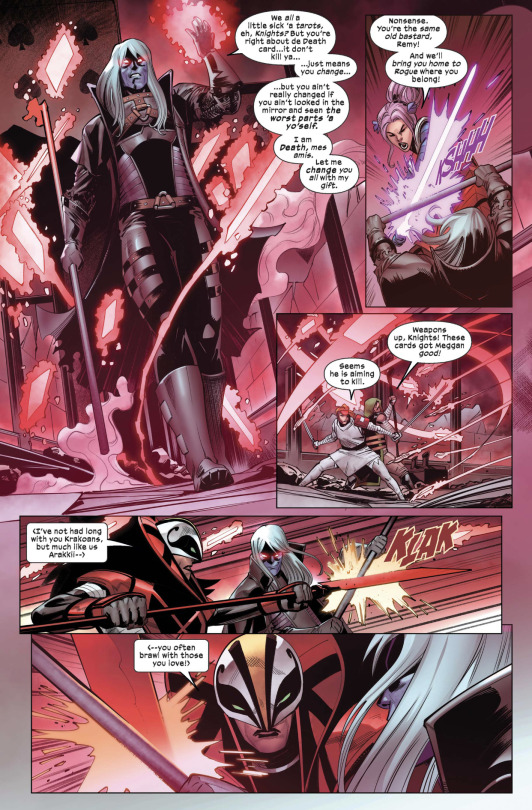
I want to point out this page for several reasons.
Firstly, it could be said that Gambit didn't want to be saved, and that's why his Death persona manifested to kill his team. He wanted to stay dead.
Secondly, Death is the very very worst part of him, yet he says, "You ain't really changed if you ain't looked in the mirror and seen the worst parts a' yo'self. I am Death, mes amis." He's essentially telling them that this terrible, awful person is who he's always been deep inside. We know this isn't true, but this is what Gambit believes.
Thirdly, as mentioned earlier, when Gambit slips into that belief of "I'm a horrible person", he often makes bad decisions. In RG23 issue 2 (set after KOX), we see him tie an innocent civilian's hand to a gas stove, turn it on and then set it on fire. Gambit knows this is a horrible thing to do, but he's in such a horrible mental state that he doesn't think he's above this behaviour. I will come back to this point.
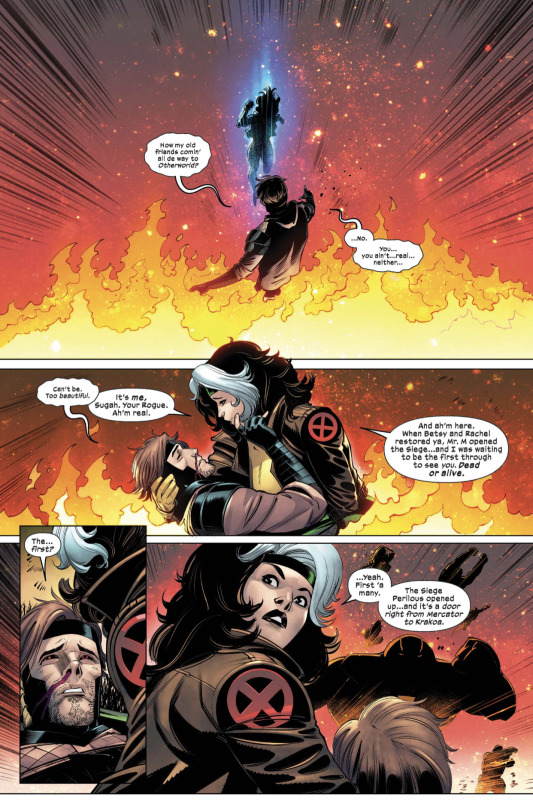
Gambit asks how anyone new is coming to the Otherworld because the gate between Krakoa and the Otherworld was closed, and Betsy could only take ten of them. To partake on such a dangerous mission, Gambit chose to risk leaving everything behind without knowing if he'd even make it back alive.
In a sense, he abandoned Rogue in a similar way to abandoning Bella Donna. He went somewhere neither of them could reach him. Or supposedly couldn't.
Rogue was first to greet him after his revival. Gambit couldn't believe this because a) he thought he was dead, and b) why would Rogue, who is too busy for him, be the first to see him after his resurrection?
It's easy to think that this moment resolved Gambit's worries that Rogue didn't love him, and that, going forward, their problems were fixed, but as RG23 shows, it didn't. Rogue showing up for him once isn't enough to fix their current issues because the problem lies deeper than Rogue's absence.
At a superficial level, it's easy to blame her for Gambit's mental state, but I believe this depression he's fallen into has been a long time coming. Decades of unprocessed trauma, insecurity and self-destructive behaviour- literally dying and coming back to life, have culminated in the Gambit we see in RG23. To be honest, you have to be in a very very dark place to kill yourself, self-sacrifice or otherwise.
Issue 1 of All New X-Factor (2014) shows Gambit is no stranger to drinking and barfights. The difference is his mindset. We know he can win a fight against multiple people- we've seen that happen many times. So why, in RG23 issue 1, was he suddenly unable to block a punch, let alone hold himself upright?
Because he didn't want to win.
When Rogue arrives to rescue him, we learn multiple things. It's not the first time he's disappeared somewhere without telling her; it's not the first time she's found him so drunk he's incapacitated; it's not the first time she's had to save him from a fight he's not winning.
What this tells me is that Gambit is purposefully putting himself in dangerous situations as a form of self-harm. He doesn't tell Rogue where he's going because he doesn't want her to save him. He drinks to the point he can barely stand to make sure there's no way he can win a fight, and then he starts a fight to get the shit kicked out of him.
It almost seems like, in some sense, he still wants to die, but he can't kill himself. Not while he remains in limbo with Rogue.
It works both ways- if he never asks Rogue how she feels, he never finds out that he's right and that she doesn't love him. He also never finds out he's wrong and that she does love him.
It's important to add here, that Rogue is in a very difficult position.
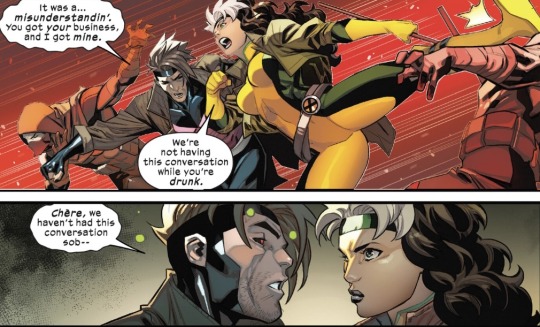
RG23 issue 1: we can see Gambit actively shutting Rogue out. He calls it a "misunderstanding" and his "business". Despite the fact that they're married, Gambit is basically telling Rogue to stay out of it.
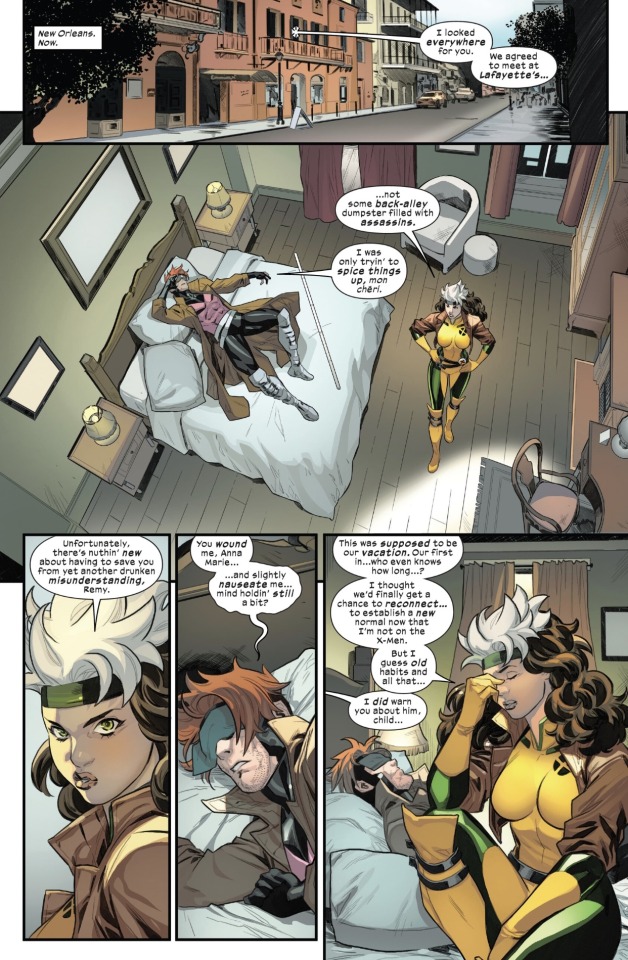
Again, he's shutting her out, making light of such a dangerous situation and then outright ignoring her. In fact, Gambit's completely disregarding her feelings. We can see Rogue is exhausted. It's hard to care about someone who doesn't care about themselves.
And Rogue does care. A lot. Every time Gambit goes missing she goes out to find him, saves him and then brings him home to take care of him.
But she can't help him if he won't let her.
When someone you love hurts themselves, it hurts you too, and Gambit is indirectly hurting Rogue, but he refuses to see that because he's decided that she doesn't care. In his spiral of self-destruction, he's completely shut down communication between them.
Asking for help is never easy to do, and we know he thinks she's too busy for him. He doesn't want to burden her with his issues.
Furthermore, he doesn't want to face his issues and resolve them.
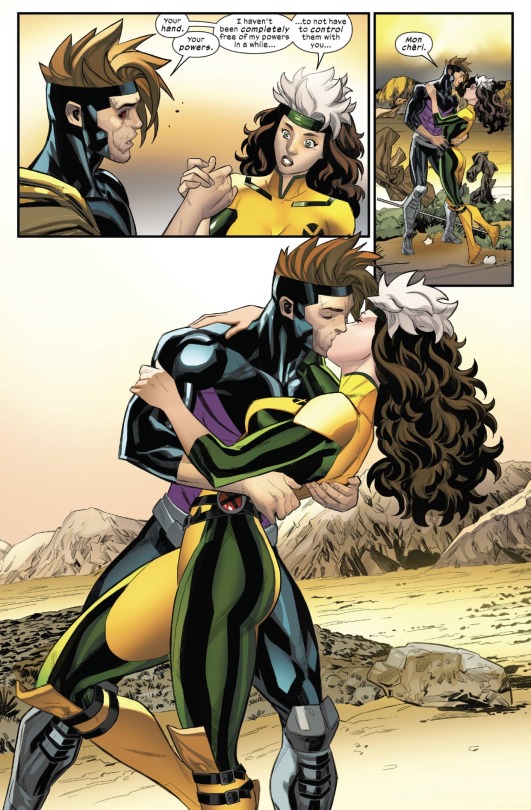
In issue 2 of RG23, after losing their powers, Rogue is freed from the burden of having to consciously control them at all times, and we see them share a moment of physical intimacy.

I find his use of "tête-à-tête" here (French for "a private conversation") ironic because we all know they weren't talking.
Returning to what I said earlier about Gambit and flings- physical intimacy is an easy way to briefly fill the void of what he's missing in emotional intimacy.
I don't believe he suddenly views his relationship with Rogue as something akin to a fling. I think the opposite.
Gambit invests in their relationship physically but not emotionally because to him, that's the safest way he can connect with Rogue right now. Touch is his love language, and when he can't find the words to speak, physical intimacy is the best he can do.
Rogue and Gambit (2018) showed us that, back then, Rogue was the one struggling to communicate her feelings, and Gambit was always very open with her about where he stood, so why the role reversal?
We can see Rogue trying to communicate, but Gambit shuts her down, pushing her away.
By doing this and holding onto the idea that Rogue doesn't love or care about him anymore, Gambit is sub-consciously trying to ruin their relationship.
Given how much he loves Rogue and wants to be with her, this tells me he's still in a very dark headspace.
Going back to the statues being parts of himself he doesn't want anyone to see, as well as becoming Death once more, and finally confessing his core belief- that he can't change, he will always be a terrible person: Gambit's trapped himself in his own insecurity.
If he opens up to Rogue, he risks her seeing him for who he truly believes he is. What comes with that? Rejection.
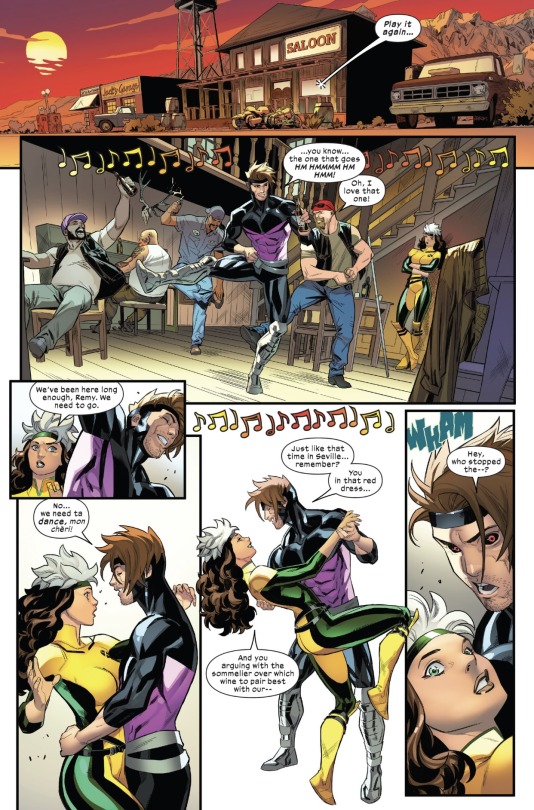
Here, we see Gambit drinking once again. Rogue also mentions how, on one occasion, he argued with a sommelier over wine. In both issue 1 and 2 Gambit's use of alcohol has been highlighted in a negative light. It's an unhealthy coping mechanism.
Also, it's easy to look at this scene and think Rogue is the one who can't let loose and lighten up, but I think what's actually happening is Gambit is ignoring her feelings, as he did in issue 1. She has a drink and two glasses next to her on the table, so it's not as if they haven't already spent a considerable amount of time having fun there.
When Rogue says they should leave, Gambit's more interested in continuing his escapism- until Black Panther arrives, and he starts another drunken fight he can't win. A pattern has been established.
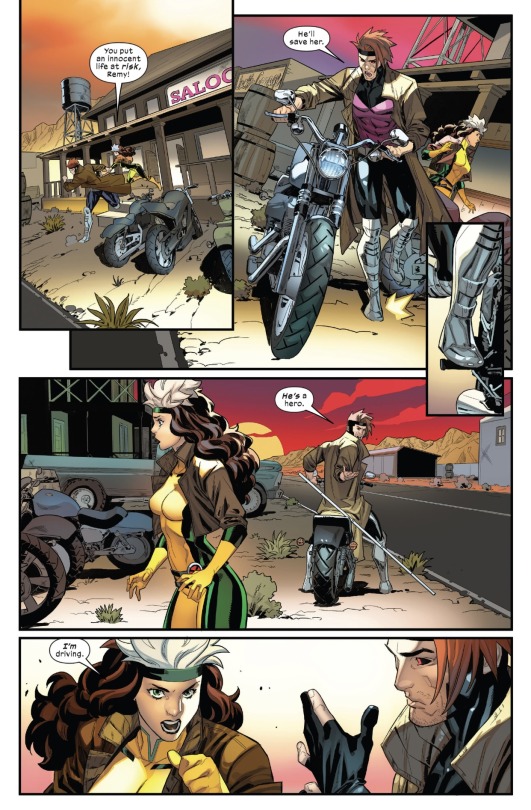
"He'll save her. He's a hero." is a very telling line that reveals why Gambit did what he did- because he's not a hero, and he knew the woman would be saved.
To reiterate, Gambit believes he is a terrible person who is not above doing terrible things. He does not change: he will always be who he was as Death. The worst of the worst.
By risking an innocent woman's life to save himself (and Rogue), he only furthers this belief.
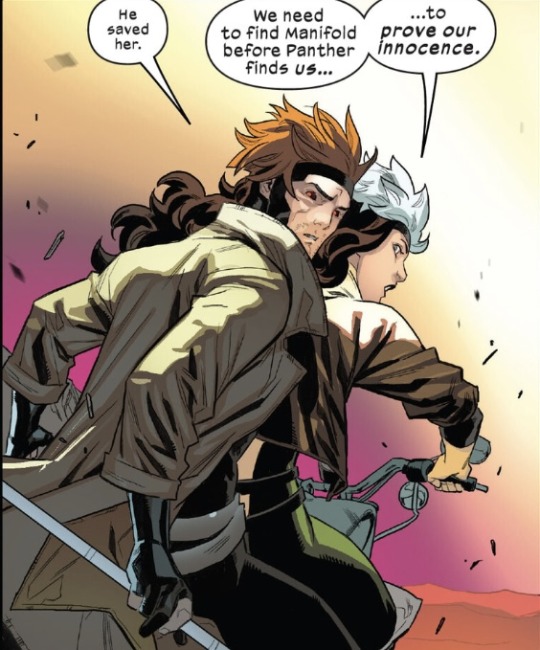
We see here that Gambit looked back to check if Black Panther did indeed save the woman he endangered. Without looking at Rogue and speaking quietly (evidenced by the smaller writing and bubble), he says to himself, "He saved her." Because Gambit isn't the terrible person he thinks himself to be- he couldn't leave without knowing the woman was safe.
This is how we, the reader, know that Gambit hasn't suddenly changed and become a terrible person. He's struggling with his mental health and sense of identity after a lifetime of trauma.
Honestly, there are so many more traumatic events I could talk about.
There's a long list of people Gambit's lost- as mentioned before, in his 1999 solo, it was shown he was partly responsible for the death of his cousin, Etienne.
In X-Men (1991), we found out that, after a failed heist, Gambit was forced by Sabretooth to pick between saving his brother and saving Genevieve. He chose his brother, and she was killed.
In his 2012 solo, Gambit's love interest, Joelle, killed herself in front of him. In his 2022 solo, he failed to save his love interest, Marissa, and as a result, she became visibly disfigured.
It goes without saying events like the Morlock Massacre would've had a huge impact on his mental health and sense of self-worth too.
If you've read all of the above, you might be wondering why only now are we getting to see the repercussions of all this? Why does all this trauma suddenly matter?
Rogue and Gambit (2018) opened the doorway for exploring their issues as a couple. Mr and Mrs X (2018) gave Rogue an opportunity to revisit her trauma (and finally conquer her powers in the process). Now, I think it's Gambit's turn. At this point, he's surpassed rock bottom, and the only way up is finally confronting these issues.
Will everything I've mentioned here be explored in Rogue and Gambit (2023)? I doubt it. It's very plot-driven and only five issues long.
However, I do think the first step for him is resolving his communication issues with Rogue, which I'm certain will happen in RG23. Afterwards, it wouldn't surprise me if we see him continue to fight his own demons in future issues until he finds his closure.
IN CONCLUSION: I understand the frustration with Gambit's characterisation and why it may seem like he's suddenly become an entirely different person. I don't expect everyone to agree with everything I've said!!
This is my personal interpretation of everything- I'm not trying to blame the current situation entirely on Gambit and act like Rogue can't make a bit more effort.
Their issues are a lot more complicated than simply Rogue not spending enough time with him.
I look forward to seeing this develop further in RG23 :D
tl;dr in my opinion his characterisation so far in Rogue and Gambit (2023) makes sense following the ideas established in Knights of X (2022): Gambit is depressed, has a very low self-esteem, and doesn’t believe Rogue loves him anymore
#i hope this all makes sense my brain turned to mush towards the end#rogue#gambit#analysis#knights of x#rogue and gambit 2023#remy lebeau#anna marie lebeau#romy#roguegambit
294 notes
·
View notes